






















OneAdvanced commissioned the Care Trends Report to understand the specific challenges care and support providers are facing and how they plan to address them The survey took responses from Care home owners CEOs MDs CFOs and COOs in domiciliary care residential care supported living extra care and retirement living
The results also found that not only are care providers having issues with rostering existing staff 31% say they have a low number of applications for open vacancies Salary also remains a concern with 40% of those working in the sector unhappy with pay while almost 35% of organisations have difficulty in providing the hours at the right time of day that employees request Alarmingly almost a quarter (23%) of those questioned admitted that payroll errors are high undermining any employee retention strategies they have in place
The survey findings further underline the problems facing these organisations with 43% saying their current IT systems are not adequate potentially putting clients at risk while more than one-third (34%) find it difficult to collate key event information, such as accidents, incidents, and safeguarding information In fact, the survey reveals that three-quarters (75%) of care provider organisations have developed their own manual processes such as spreadsheets to provide sufficient visibility of their business
On a positive note the report shows that leaders are less stressed now than in 2023 with 39% of leaders said they feel stressed and unable to cope some or all the time, a significant drop from the 62% in 2023 Martin Green Chief Executive Officer Care England commented This report highlights some alarming disparities between the technology that care provider organisations need for greater operational efficiency, and the digital systems they currently have in place There is massive scope for digital systems to automate processes, saving many hours of repetitive manual work, reducing errors, driving higher levels of compliance and quality of care
He goes on to say; “The care sector is at a crossroads, and it is imperative that the right decisions are made now to steer it along the path that leads to greater efficiency and higher productivity making the best use of the precious resources we have to ensure a professional and human-centred service that is fit for purpose now and into the future
“This is our second annual report into the state of the UK care sector and the findings highlight a sector in continuing crisis said Ric Thompson Senior Vice President – Health and Care at OneAdvanced “Worryingly not much has changed since last year’s survey Staffing rostering void management lack of adequate digital tools and reliance on manual processes continue to impede the efforts of care provider organisations ensuring they are not operating efficiently and making an already tough job even tougher It
has never been more important to tighten up processes and practices The tough economic climate does not leave much room for wastefulness and adherence to slow manual processes With budgets becoming tighter every year, providers are continually under pressure to achieve more, with less ”
RED TAPE
Concerns over staffing issues were also highlighted earlier this month when campaigners in Scotland highlighted that a loss of overseas workers due to increased red tape could have a “severe and dramatic impact” on social care
Scottish Care conducted a survey revealing significant challenges faced by care providers in recruiting and retaining internationally recruited staff
The findings shed light on the potential risks to social care service delivery across Scotland due to recent decisions by the Home Office regarding international recruitment pathways
The survey was initiated in response to Scottish Care member reports regarding increasing difficulties in international recruitment
The Home Office s decision to request additional documentation and communication issues exacerbated concerns among care providers, particularly around Certificates of Sponsorship
Data gathered from the survey revealed several key insights:
Over 66% of Scottish Care members are currently recruiting staff from overseas, indicating a heavy reliance on international recruitment pathways
However 68% of respondents expressed reluctance to consider international recruitment in the future due to concerns over sustainability and financially viability
Respondents from 14 Local Authority areas indicate that care providers employ over 15% of staff from overseas with 7 areas reporting over 25%
Alarmingly some care providers reported between 95 – 100% of staff being internationally recruited posing significant risks to service sustainability SERIOUS CONCERN
Scottish Care said: These findings highlight a serious concern over the sustainability of social care delivery in Scotland The potential loss of internationally recruited staff could intensify the existing vacancy challenges and impact overall service provision
“Scottish Care urges policymakers to address the urgent issues facing social care recruitment Immediate action is needed to protect social care service provision and support the sector s workforce VITAL CONTRIBUTION
A government spokesperson said: “Care workers make a vital contribution to society but immigration is not the long-term answer to our social care needs
120 000 dependants accompanied 100 000 care workers in the year ending Sep 2023 and these numbers are unsustainable which is why we laid measures in Parliament to cut this figure ”

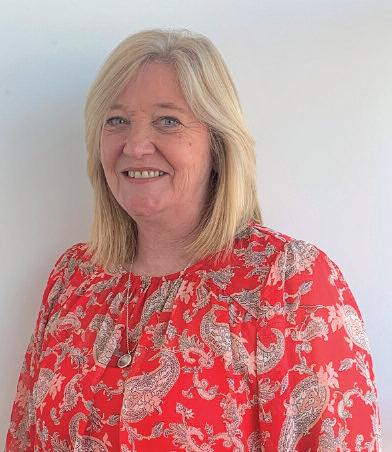
tailoring care plans to meet the specific needs of each resident
It's crucial to understand that different forms of dementia may present with varying early indicators For instance Lewy body dementia may initially manifest with hallucinations rather than memory loss, while Alzheimer's disease often presents with memory-related symptoms early on Frontotemporal dementia on the other hand, may involve changes in personality as an early sign Despite these differences overlapping symptoms become more apparent in later stages emphasising the need for comprehensive care and monitoring
There are currently around 900 000 people diagnosed with dementia in the UK and this number is set to rise to a staggering 1 6 million by 2040 These statistics underscore the urgent need for specialised care and support for individuals affected by dementia Additionally 1 in 6 people over the age of 80 have dementia, highlighting the prevalence of this condition among the elderly population
Dementia, a progressive cognitive condition, presents unique challenges for both individuals with the condition and their caregivers It requires not only patience and empathy but also specialised knowledge and skills Westgate Healthcare’s dementia training combines classroom learning with practical demonstrations using modified equipment and simulated scenarios allowing our teams to better comprehend the difficulties faced by those living with dementia This hands-on approach enables our caregivers to develop a deeper understanding of the condition, laying the groundwork for person-centered care that preserves the
By Maria Fagen, Group Training Manager, Westgate Healthcare (www westgatehealthcare co uk)dignity and uniqueness of each resident
Furthermore dementia training empowers our teams to employ effective communication strategies transcending language barriers and cognitive limitations Techniques such as validation and reminiscence therapy enable caregivers to connect with residents on a meaningful level fostering a sense of belonging and reducing confusion or agitation Additionally training equips our team with practical skills to create dementia-friendly environments within our care homes From optimising physical spaces to implementing structured routines and engaging activities, every aspect of Westgate Healthcare homes is designed to promote independence and enhance quality of life for residents living with dementia
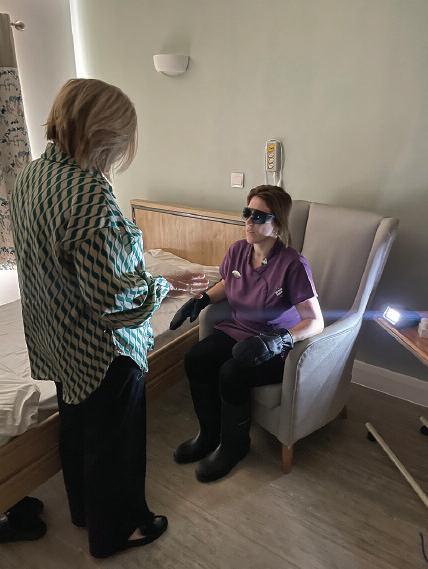
Continuous team member training ensures that our caregivers remain abreast of the latest developments in dementia care research and best practices As the field evolves so too does our approach with ongoing education enabling us to refine and improve the quality of care we provide Maria Fagen has over two decades of invaluable care experience, including Domiciliary care Her vast knowledge made her uniquely qualified to transition into the training realm a position she has held for the past seven years Leading all Westgate Healthcare team member training sessions Maria s expertise covers a range of essential topics ensuring that our staff are well-prepared to deliver exceptional care At Westgate Healthcare our commitment to training goes beyond compliance; it reflects our dedication to excellence in elderly care By investing in the professional development of our team we enhance the lives of residents living with dementia and enrich the overall care experience for everyone in our homes
With the Eurovision Song Contest around the corner once again Thornton Hall and Lodge Care Home scored ‘douze points’ this week as it celebrated the 50th anniversary of ABBA s contest win with a 1974-themed party!
Thorton Hall, in Crosby near Liverpool, knew for sure What’s The Name of the Game was with their 70 s style party complete with swirly-patterned shirts, flared trousers and a sound system blaring out Eurovision favourites including all the hits from the Swedish quartet!
Thornton Hall is part of the Orchard Care Homes group, which operates 23 care homes across the Midlands and the north The home offers residential dementia care as well as short-term respite care all under the Orchard ethos of care and respect for the individual on a one-to-one basis, making each resident feel as welcomed and cared for as possible
There were a fair few Dancing Queens at the party which turned music-

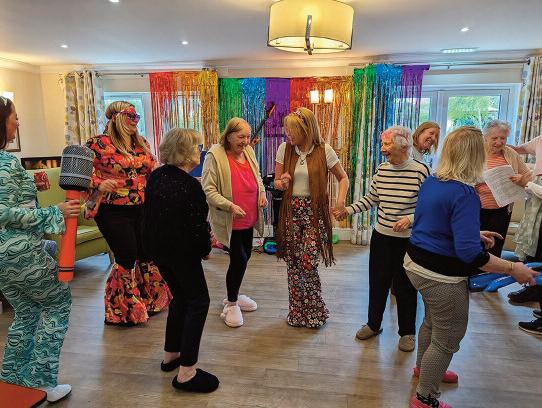
mad Liverpool into a Summer Night City once again with the party having 70’s style party food and a chance to try out the karaoke machine
Emily Dickson activities coordinator at Thornton Hall said: “We never need an excuse to throw a party and the 50th anniversary of ABBA s Eurovision win gave us the perfect reason It was wonderful to see the smiles on our residents’ faces – and I want to thank everyone who worked hard for their enjoyment; I must also say Thank You For The Music!
Resident Anne said I had an amazing time singing and dancing with all my friends and family from the home ”
Michelle Duvall Home Manager added: “So many of our residents are ABBA fans so it was a great reason to have a party themed around the band to trigger some happy thoughts from their pasts Each of them is a winner and for them The Winner Takes It All!”
Residents and guests at The Cedars Care Home in Bourne enjoyed an elegant afternoon of tea tasting and cakes to celebrate National Tea Day Based on the incredible Betty’s Tearooms in Harrogate, the pop up café included sampling a selection of different teas including floral and fruity, loose leaf traditional and bubble teas; accompanied by wonderful fresh baked scone with jam cream and strawberries and a selection of tea flavoured loaf cakes handmade by the hospitality team There was much laughter and many compliments on the day Visitors and residents loved the vintage tea room and the traditional serving outfits worn by the team The room was decorated with a variety of floral arrangements in the conservatory to create a Victorian orangery
vibe and a selection of vintage crockery with background music from Glen Miller completed the ambiance Senior General Manager, Rebecca Aldred said, “Our residents and guests had a wonderful afternoon at our pop-up Betty s of Bourne We all love a cuppa, and the vintage environment made it extra special We do our best to provide a wide range of activities and entertainment at The Cedars as part of the lifestyle enrichment programme for residents ”
Resident Lydia said I really enjoyed the tea rooms it was a lovely afternoon,” whilst Daphne was very happy to try the bubble tea, saying I like lots of different flavoured teas but I ve never tried that!

The government has launched a new six-week call for evidence to explore how the duty of candour is delivered, in a further bid to boost patient safety as well as the honesty and transparency of the NHS
The new call for evidence launched aims to capture and consider views about how the duty of candour system is honoured, monitored and enforced in health and social care settings
The duty of candour requires health and care providers to be open and honest when things go wrong It means that patients and families have a right to receive explanations for what happened as soon as possible and a meaningful apology
The current system has been in place for a decade and this review will look at how it is operating amid concerns that there is some inconsistency in how it is being applied
Minister for Mental Health and Women s Health Strategy Maria Caulfield said: I spent 20 years working as a nurse in the NHS, and I know how important it is that health and care providers are open with patients and their loved ones – especially if something has gone wrong
“I want to ensure that our system of duty of candour is kept up to date so I urge anyone with views or experience to respond to the call for evidence to help inform our review which will ensure that honesty and
Barchester s Ashcombe
House care home, in Worting Road were amazed, educated and inspired with a visit from some unusual creatures along with ranger Ben from Zoolab Zoolab specialises in bringing reptiles and small animals into a safe environment while its trained staff educate about the different species with plenty of interesting facts Animal assisted therapy is recognised as an occupational therapy within psychology, suggesting animals bring people together The trained rangers can see the positive impact these encounters can have, making people’s lives better
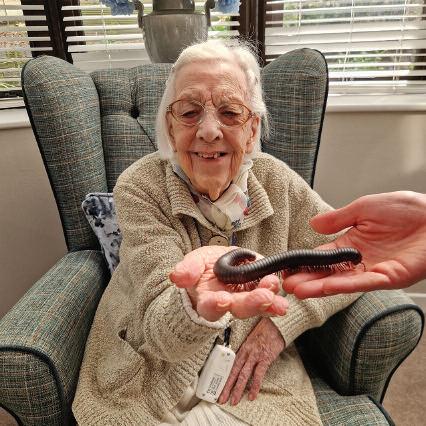
Residents at Ashcombe were pleasantly sur-
prised to meet Giant African land snail Gary, tree frogs, Corn snakes and stick insects to name just a few They had the opportunity to hold the creatures and ask questions
Deputy Manager Bianca Garcia said: “Our residents and staff have all really enjoyed their unusual visitor s today There s nothing more unusual for the residents than snakes millipedes and tree frogs they surprised me with how brave they all are!
Resident Gwen Lloyd who was one of the bravest residents handling every creepy crawly said: “There s nothing to be scared of, they are only tiny look how big we are they won t hurt you
integrity remain at the heart of our health and social care services
The duty of candour review call for evidence has opened today and will run for 6 weeks
It follows a range of measures the government has announced to improve patient safety In February the department announced the rollout of Martha’s Rule to over 100 acute sites by March 2025 Martha’s Rule entitles patients and family members who are concerned that their condition is deteriorating to initiate a rapid review by someone outside of their initial care team
This week the Department of Health and Social Care also confirmed that the strengthening of death certificate safeguards would come into force in September with medical examiners looking at the cause of death in all cases that have not been referred to the coroner
The review into duty of candour has gained widespread support from the health and care sectors which see the review as an important way to ensure that healthcare providers are adhering to best practice
Patient Safety Commissioner Henrietta Hughes said: I welcome the fact that duty of candour is being reviewed because it is important that people do not struggle to get information when something has gone wrong Working with patients as partners is an opportunity for us to learn and improve


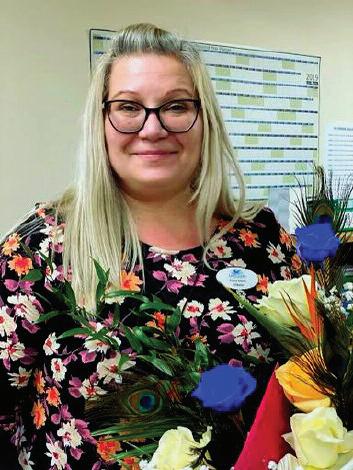
As the Director of Operations and Commissioning at Langdale Care Homes and a seasoned nurse with over 20 years in the healthcare industry I have witnessed first-hand the challenges posed by falls among elderly residents It is a subject close to my heart and I feel it is of utmost importance to share our comprehensive and sensitive approach to this matter
Falls can have devastating effects on the physical, mental and emotional health of our elderly residents leading to injury hospitalisation and a decline in confidence and independence However they are not an inevitable part of ageing With effective strategies and due diligence we can significantly reduce the risk and impact of falls
Our approach is rooted in individualised care Each resident is unique and so too are their risks and vulnerabilities A thorough and personalised risk assessment is the cornerstone of our falls management strategy The assessment covers a wide range of areas from physical health mobility and medication to environmental factors within the home
In terms of physical health we pay keen attention to conditions known to increase fall risk such as poor vision, arthritis, and neurological impairments Regular health check-ups, coupled with personalised exercise programmes to improve strength and balance have proven highly effective Our team works closely with residents, ensuring they feel comfortable and confident in performing these exercises
Medication can also significantly influence fall risk As a nurse I understand the complex interactions between various drugs, and how they can affect balance and coordination Therefore, we regularly review residents medication regimes liaising with GPs and Pharmacists to ensure any potential risks are mitigated We also recognise the essential role of the environment in falls prevention Simple adjustments like
improving lighting reducing clutter and installing grab bars can make a significant difference We continuously assess our home s environment to ensure it is as safe and supportive as possible
Communication I believe is at the heart of successful falls management It involves regular dialogue between our team residents and their families We encourage our residents to express their fears and concerns regarding falls, empowering them to take an active role in their care
Education is another pillar of our approach We provide ongoing training to our staff ensuring they are up to date with the latest evidence-based practices in falls prevention This includes understanding the complex interplay of factors contributing to falls and how to respond effectively when a fall does occur I have actively participated in falls management projects like the Winn Care Cushions and ISTUMBLE pilot These innovative initiatives use advanced technology to prevent falls and minimise their impact enhancing quality of life for residents I have also attended the Derbyshire provider forum trainings on Falls Prevention, equipping me with essential knowledge and skills My involvement not only aids in proactive falls prevention but also in providing effective empathetic responses when falls occur This continuous learning and improvement in falls management ensures optimal support and care for our residents Through our robust falls management strategy we have seen a significant reduction in falls alongside an improvement in our residents' confidence and quality of life However we never rest on our laurels We continuously strive to learn improve and innovate driven by our commitment to providing the highest quality care to our residents at Langdale Care Homes
In conclusion, managing falls among elderly residents requires a comprehensive, individualised, and proactive approach It involves regular risk assessments environmental modifications effective communication, and ongoing education As care providers, it is our duty to ensure our residents can live their lives with dignity independence and confidence In doing so we not only reduce the risk and impact of falls but also enhance the overall wellbeing of our residents The journey to effective falls management is ongoing, but with each step we take we move closer to our goal of a safer happier and healthier home for our elderly residents
Catherine House Care Home pulled out all the stops for their beach-themed extravaganza bursting with energy and nostalgia Residents (fondly referred to as family members) and team members enjoyed the feeling of sun-kissed shores and salty sea breezes
The highlight of the event was undoubtedly the captivating performance by Professor Paul Wheeler whose traditional Punch and Judy Show had everyone in stitches as the classic characters came to life, their antics creating moments of joy and amusement that transcended age
But the entertainment was just the beginning! The dining room had been put-together with beach-themed colourful tablecloths inflatable palm trees and tropical sun-

glasses were perched on noses adding a playful touch to the festivities The team also brought the beach to the home by adding sand on to the tables and floor
For many of the family members the event was more than just an afternoon of fun with nostalgic moments of spending time at the seaside especially with the recent trips to Weymouth Family member David commented “it s brought back a lot of memories from my childhood
As the party drew to a close, the sense of fun lingered in the air, a reminder of the power of community to uplift and inspire Catherine House Care Home continues it s unwavering commitment to nurturing this vibrant atmosphere for its family members and the wider Frome community
THE INDEPENDENT SPECIALIST CONSULTANCY FOR IMPLEMENTING:
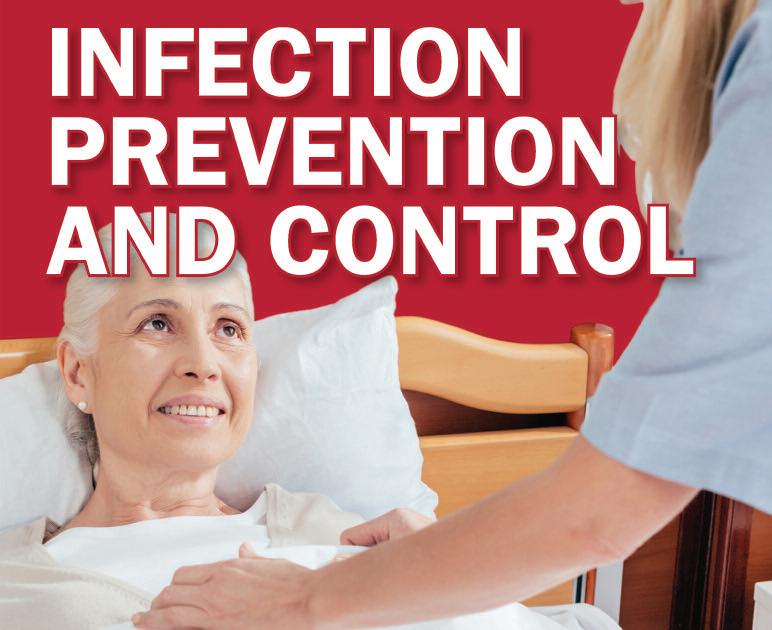
• ANTIMICROBIAL FABRIC TREATMENTS
• L AUNDR Y HYGIENE AND EFFICIENCY
• ANTIMICROBIAL HARD SURFACE COATINGS
• LEGIONELL A CONTROL
• OZONE ROOM SANITISERS
AND REDUCE OPERATING COSTS:
• Energy and utilities procurement
• Energy survey to identify savings
• Carbon footprinting, net zero strategy and sustainability
• Building services management
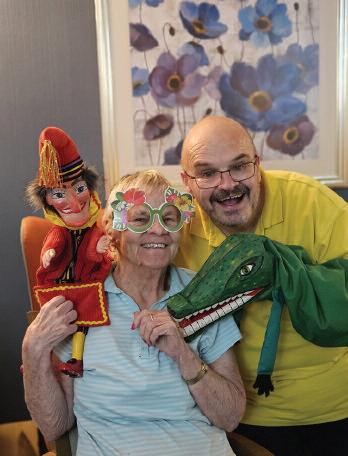

Minister for Social Care Dawn Bowden has launched a new National Office for Care and Support marking an important step towards a National Care Service in Wales
The launch of the national office is the first part of the phased plan to implement the National Care Service which is a shared priority in the Co-operation Agreement between the Welsh Government and Plaid Cymru
The National Office for Care and Support will primarily focus on supporting the Chief Social Care Officer for Wales in their role delivering a National Care Service for Wales and implementing the National Commissioning Framework for Care and Support in Wales
Newly-appointed Minister for Social Care Dawn Bowden said: The number of people aged 85 and over in Wales is projected to increase by more than 65% over the next 20 years – it is to be celebrated that we are living longer but it also means we need to radically rethink how we care for our older population ”
The launch of the National Office for Care and Support is another
important milestone in our ambitious journey to create a National Care and Support Service It will be crucial to help guide the sector as it drives improvements in access to care and the experience of service users
It will also play an essential role in the integration of health and social care, working closely with the NHS Executive to ensure Wales health and social care system is fit for the future
Albert Heaney Chief Social Care Officer for Wales said: “The national office will bring together the 22 local authorities involve people who use social care services their carers, the workforce, professional bodies and key partners to work together to delivery national priorities, quality standards, particularly in relation to commissioning of care and support services
“It will help me as the chief social care officer to direct resources where they are most in need and benefit the most vulnerable driving improvement in the national delivery of

As part of their Intergenerational working initiative MHA's Connell Court encourage students pupils and children to visit the home and engage with their residents
Isla & Chloe Y11 Students from Greenbank High school have been volunteering at Connell Court for the last 6 months as part of their Silver Duke of Edinburgh Award
Talking to Connell Court s residents participating in activities helping staff during meal times joining in with their church service both girls have had an insight into life at a Residential Care home
Wishing you both the best of luck with your future

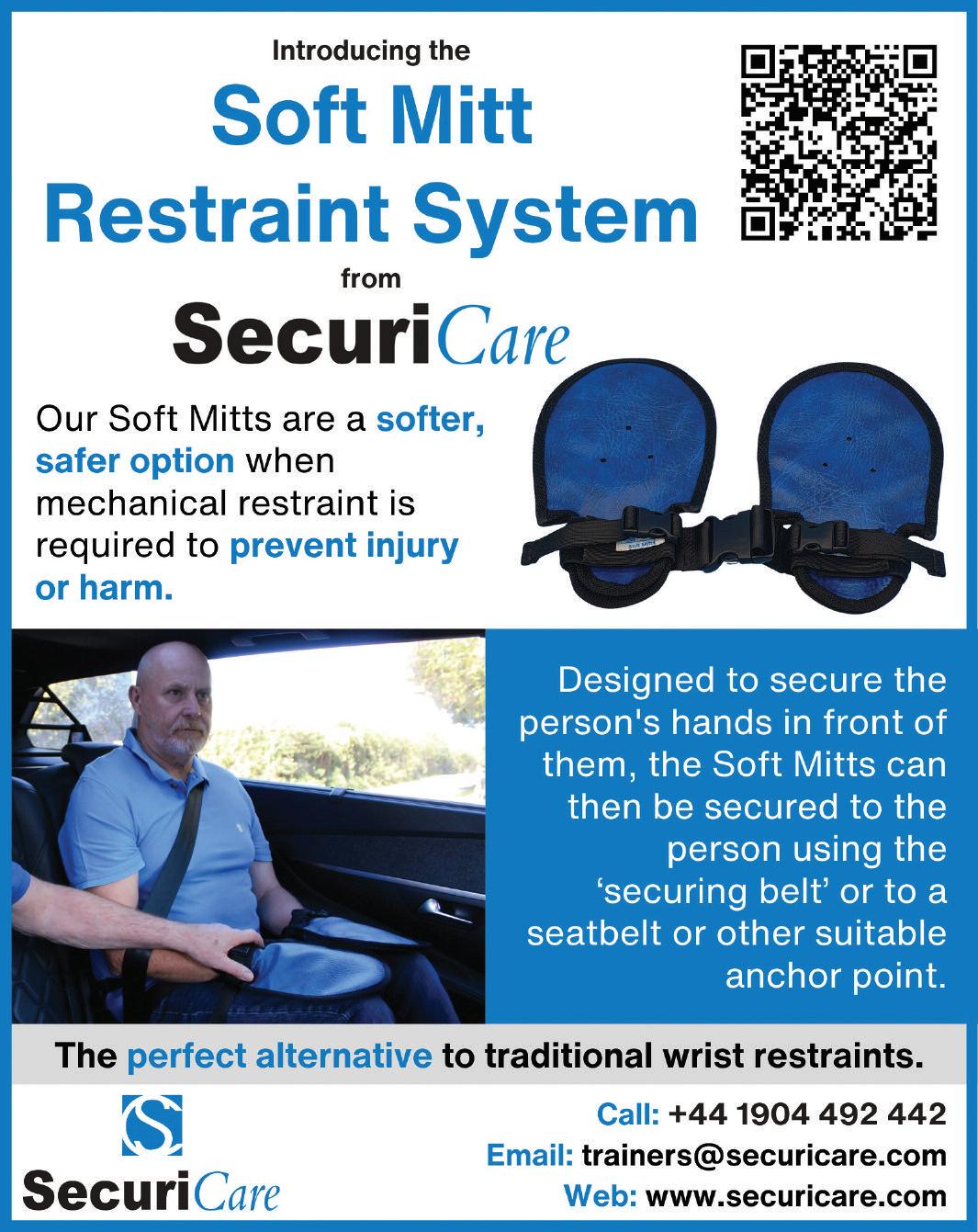
social care in Wales to achieve better and more equitable outcomes access and service-user experience ”



The Information Commissioner s Office (ICO) is supporting health and social care organisations to ensure they are being transparent with people about how their personal information is being used
The UK data protection regulator has today published new guidance to provide regulatory certainty on how these organisations should keep people properly informed
The health and social care sectors routinely handle sensitive information about the most intimate aspects of someone’s health which is provided in confidence to trusted practitioners Under data protection law people have a right to know what is happening to their personal information which is particularly important when accessing vital services
Anne Russell head of regulatory policy projects at ICO said: “Being transparent is essential to building public trust in health and social care services If people clearly understand how and why their personal information is being used they are likely to feel empowered to share their health information to both access care and support

initiatives such as medical research
As new technologies are developed and deployed in the health sector our personal information is becoming more important than ever to boost the efficiency and public benefit of these systems With this bespoke guidance we want to support health and social care organisations by improving their understanding of effective transparency ensuring that they are clear open and honest with everyone whose personal information is being used ”
The guidance will help organisations to understand the definition of transparency and assess appropriate levels of transparency as well as providing practical steps to developing effective transparency information
Following a public consultation earlier this year the guidance incorporates feedback from health and social care organisations across the UK Aimed at any organisation that delivers a heath or social care service or uses health and social care information it supplements existing ICO guidance on the principle of transparency and the right to be informed
The team at Dearnevale care home part of Exemplar Health Care is celebrating achieving what is believed to be a UK-first Triple Crown achievement having been accredited by the national charity Huntington s Disease Association as part of their Quality Assured kitemark scheme
Dearnevale also holds both a Care Quality Commission ‘Outstanding’ rating, and a perfect 10 out of 10 score on care home comparison website carehome co uk The rating is based on 50 recent independently verified reviews by residents and relatives
Dearnevale is believed to be the only care home in the UK to simultaneously hold a perfect regulator rating perfect carehome co uk review score, and accreditation from a national care-related charity
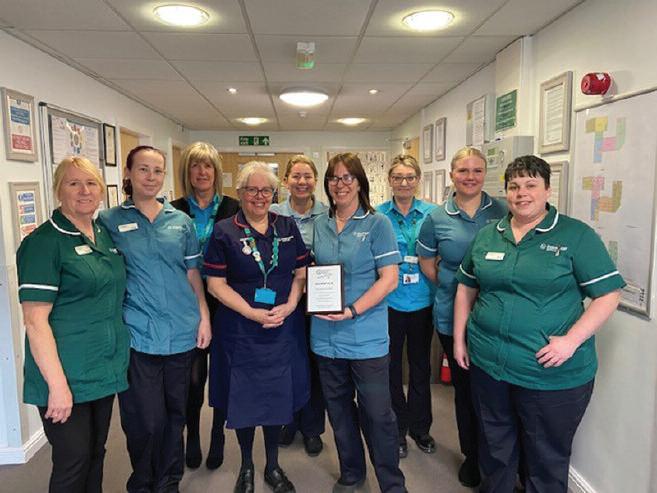
Described as a quality assurance programme that identifies the behaviours, cultures and specialist services required for a care home to specialise in caring for people affected by Huntington s disease the Huntington’s Disease Association’s ‘Quality Assured’ kitemark is an exacting standard that is very difficult to achieve – Dearnevale is one of only nine care homes in the whole UK to hold this accreditation
Helen McGowan Home Manager at Dearnevale care home said of the accomplishment "We are immensely proud to be recognised as one of the best care homes in the country having achieved a trifecta of accolades Our dedicated team works tirelessly to create a fun and supportive environment ensuring that every aspect of our care makes every day better for the people we support
Whilst I m deeply humbled that we ve achieved recognition from the Care Quality Commission carehome co uk and Huntington’s Disease Association the most important feedback will always come from the people who choose to make their home with us
“Every day we wake up wanting to make sure we do the best we can for them provide the highest standard of care support everyone with dignity and respect, and give them all choice and control over their lives
Empowering the people we support is what powers us to continually
strive for excellence ”


Between August 2022 to July 2023, 388 compliance visits to care businesses took place of which 80% of sponsors were found not to have met their compliance duties
The report also identified that local authorities had not been informed when sponsor licences were suspended or revoked leaving them unable to check on or provide alternatives for affected workers and their dependents Additionally serious concerns about modern slavery were identified in the employment of migrant care workers including the lack of safeguarding debt bondage labour exploitation and even physical and sexual abuse
The Home Office has suggested it will adopt the report s five recommendations including reviewing the visa route; reviewing its process for licensing and decision making; reviewing its departmental compliance (including headcount performance targets and processes); agreeing a multi-partner memorandum of understanding with enforcement and regulatory partners; and producing a migrants guide to employment rights”
An attempt has already been made to address some of these concerns and procedural and operational changes are being introduced
Prior to the report the Home Office established a “sponsor of concern process in August 2023 a fast-track process to suspend or revoke licences held by high-risk employers Rule changes to assess the genuineness of applications were also implemented and a Genuineness Team” was established to assess cases of concern
The report criticised the Home Office for not appreciating the skills shortage and nature of the care sector, ultimately failing to be sufficiently prepared for the demand in the adult and social care sector poor communication and engagement with sector stakeholders and lack of measures to prevent the risks of exploitation of workers in the care sector
The government forecasted 6 000–40 000 applications on the Health and Care Worker route yet 146 182 care worker visa applications were granted (including dependants) between February 2022 to October 2023 Businesses registered as sponsors almost tripled from 32 264 in December 2020 to 94,704 by November 2023
Staffing in Home Office compliance teams didn t increase to match the demand but instead suffered recruitment and retention issues ultimately compromising their ability to undertake proper checks to validate sponsor businesses assess genuineness of vacancies and monitor compliance Mistakes were inevitably made, including issuing licences to businesses falsely using the data of care homes to obtain them; granting excessive numbers of certificates to businesses (275 in one instance) without genuine vacancies or work; and identifying businesses as low risk which were later suspended for failing to comply with sponsor duties or supplying workers to third parties as labour or to facilitate illegal migration to the UK
The Home Office now requires further evidence at the licence application and COS allocation stages from sponsors in the care sector, eg contracts and agreements with local authorities to evidence genuine recruitment needs and vacancies In-person and remote compliance audits of care businesses are also regularly undertaken and businesses are receiving suspension correspondence whilst allegations of abuse and / or non-compliance are investigated
Since March 2024 the Immigration Rules now require care businesses in England to be CQC registered to sponsor care workers and family members of new sponsored care workers can no longer join them as dependants
Considering the recent report and the intense scrutiny, care businesses must ensure compliance with the sponsorship regime and avoid being drawn into unlawful or abusive practices or they risk losing their sponsored status
Practical steps towards compliance include:
• Limiting access to sponsor licences to trustworthy and reliable staff members and appointing the most senior as key personnel
• An Authorising Officer should oversee and regularly check in on the sponsor licence to ensure it is being used responsibly The Home Office expects an Authorising Officer to do this monthly already Alternatively, external lawyers can also be appointed as Level 1 Users and manage licences on the behalf of businesses to provide valuable oversight and
prevent any abuse of the licence
Business owners and managers should be fully familiar with their licence obligations and responsibilities and check these are being strictly observed This would include ensuring employees are working their contractual hours there are no unauthorised absences staff are trained supervised and assessed as competent to carry out their roles
salary reductions are made in compliance with salary thresholds and reported accordingly Where necessary additional training regarding this and compliance and monitoring of sponsored workers should be sought from experienced lawyers
Additional checks should be incorporated for staff taken on in supplementary employment to check they are not exceeding 20 hours, that they continue to work for their sponsor and their normal hours of work Their role s occupation code and job description and evidence of this from their sponsor should also be obtained and retained
Specifically relating to recruitment it s important to:
Implement clear and tight policies, procedures and oversight, ensuring only those meeting skills experience and qualifications specified are recruited that right to work checks are being properly carried out, and that personnel records are kept in line with Appendix D including evidence of how sponsored workers were identified for recruitment and how they meet the skills and qualifications required for their roles
Advertise roles widely to demonstrate attempts made to source local employees and that sponsorship is only pursued where necessary
Evidence recruitment needs through contracts and agreements as they must reflect genuine vacancies
Employment of sponsored workers should be strictly aligned with their contracts with managers implementing monitoring and reporting requirements of foreign workers
The findings of the Home Office report also raise important reminders from an employment law perspective:
• Employers must monitor hours worked to ensure compliance with the requirements of the Working Time Regulations regarding hours worked and ensuring appropriate breaks are given It’s also important to understand how many hours are worked and what is paid to ensure compliance with the National Minimum Wage
• Employees can feel as if they re in a vicious cycle – afraid to raise concerns for fear of reprisals while struggling to work under unsafe or abusive working conditions Employers must ensure that any concerns raised by staff about poor working conditions and breaches of any safeguarding or Home Office guidance are treated seriously and fully investigated Employees raising these concerns could be whistleblowers, a status which gives them additional employment law protection
Where employees from other countries who are working on visas are treated less favourably than employees who are born in the UK this can place employers at risk of discrimination claims
Given the intense scrutiny and pressures on care businesses many of which are dependent on sponsored personnel to run their business, a mock audit supported and run by legal advisors is an effective way to ensure systems and practices are robust and compliant

The National Association for Safety and Health in Care Services (NASHiCS) focuses on all Health and Safety matters affecting the social care sector The association has gone from strength to strength since its inception and has a growing membership across many care providers and organisations covering the UK
Keeping up to date regarding Health and Safety matters is vital The more you know the more you can plan and the more you plan the less you are susceptible in turbulent times to both internal and external risks
Through the association you can Network with colleagues responsible for Health and Safety share your own best practice experiences and hear how others have overcome challenges
Source dedicated events on health and safety in the sector and participate in national and local Networkers Conferences Seminars in-person or virtual webinars
Advertise job vacancies and benefit from favourable member offers and rates from suppliers of goods services and equipment

Receive regular update emails covering latest developments and safety alerts/news; while giving access to current information links on key safety topics; and monthly our highly praised e-News Matters covered range from fire safety training infection control lone working falls prevention first aid to stress legionella case law regulation people moving people and mock courts to mention just a few See our website for information on past as well as future events – www nashics org
We have developed national links with other organisations, government bodies, regulators and enforcement agencies Our aim is to promote and improve safety and health in care practice by providing a sharing and networking forum for debate, and discussion
Joining NASHiCS is a great and easy way to keep informed and aware Health and Safety is an essential element in the workplace and matters to everyone involved with social care now and in the
Calls to the UK s Modern Slavery and Exploitation Helpline are at a record high, marking the fourth consecutive year of increases according to a survey by charity Unseen Calls by care workers reported by the Modern Slavery & Exploitation Helpline rose to 918 in 2023 up from 708 in 2022 an increase of 30%
Justine Carter director of Unseen and co-author of the report said: “Modern slavery and exploitation are heinous crimes that have no place in a modern progressive UK that cares about human rights
It is encouraging that we are continuing to see rising numbers of calls and contacts to the Helpline, indicating that we are succeeding in raising awareness of the issue and mobilising more people to act ”
The Helpline data exposes the global reach of modern slavery In 2023 potential victims came from 106 countries up from 99 the previous year The most common nationalities reported were Indian Romanian Albanian Vietnamese and Chinese India became the most prevalent potential victim nationality for the first time, predominantly due to labour exploitation within the care sector This shift marks a change from past years, where Romanian
nationals had been the most common nationality reported every year since the Helpline was founded in 2016 DECLINE IN NUMBER OF POTENTIAL VICTIMS AND MODERN SLAVERY CASES
The rise in calls and contacts to the Helpline comes despite an overall fall in the number of potential victims and modern slavery cases reported
In 2023:
The number of potential victims indicated at the Helpline was 5 876 down 10% on 2022 (6 516)
The number of modern slavery cases raised was 2 185 down 16% on 2022 (2 588)
Justine Carter says: We remain concerned that the ever-increasing hostile environment in the UK towards migrants and foreign workers means that fewer people feel able to raise concerns and seek the help and support that they desperately need “More needs to be done to encourage victims to come forward and to properly resource efforts to stamp out modern slavery and exploitation for good ”







However simply increasing nursing input was unlikely to be a cost-effective way of reducing adverse incidents in care homes The study found that although there might be savings to the wider healthcare system in reduced treatment costs any savings would be wiped out by the high additional costs of employing more nurses
The study also found:
Care homes with a manager in-post in the 12 months prior to a CQC inspection were more likely to be rated as good or outstanding
homes is a societal priority It is vital that we know how to use the workforce resources in care homes to promote quality and effective working The study team speculated that staffing and ways of working were key influences on quality Working with managers residents families and care home staff from a range of care homes in England the researchers set out to find out how and why staffing in care homes affects the quality of life and care of the residents
The team analysed research journal articles, care home and care organisation data to look at what it is about staffing that influences quality They analysed reports and ratings of homes from the Care Quality Commission (CQC) regulator, and networks between staff in homes
According to the results staffing considerations that might improve quality include not swapping managers too much; having sufficient and consistent staff for family-like relationships in homes and putting residents needs first; supporting staff and giving them freedom to act and key staff leading by example
Professor Karen Spilsbury, School of Healthcare The research also showed that where more care was provided by registered nurses there were fewer incidents such as falls with fractures urinary tract infections and medication errors
The excitement is building as CleanEx2024 – the only UK exhibition dedicated to the laundry and textile care industry – looks to set records when the doors open at Ascot Racecourse on Sunday 28 April and Monday 29 April
CleanEx encompasses every facet of the industry and since its inception in 2012 the biennial event has grown enormously New equipment launched machinery demonstrations – in fact everything from detergents to large washers dryers to bed linen can be seen and compared This exhibition includes the biggest names in the sector alongside newer entrants keen to show off their ingenuity and showcase products This year sustainability and products which save time and energy are expected to draw a wide audience
CleanEx 2024 like its successful predecessors attracts visitors from across the UK and the rest of the world
Virtually all attendees have buyer power within their organisation and are looking to make the most of this
Higher staff-to-bed ratios were associated with a greater chance of a good or outstanding CQC inspection score
Having experienced care staff that is staff in post for 5 years was likely to improve quality as measured by CQC ratings and staffing consistency was important for organising care and work
Larger homes were less likely to be rated positively but team size (not home size) may be a useful lever for promoting quality i e small groups of linked residents and staff (5–15 residents per staff member based on level of resident dependency) promoted familiarity communication and a family-like environment for cultivating relationships
• Use of agency nurses to cover for staff sickness or unfilled vacancies was not associated with more falls infections or pressure ulcers but was associated with more medication errors
Professor Spilsbury, who is also NICHE-Leeds’ Academic Director, added: “Staffing in care homes matters and needs to be valued It needs to be stable, skilled and competent, to realise the benefits of personfocused organisation of care and enhanced teamworking
“Our study shows that leadership, reward and recognition of staff, and a shared philosophy of care are key to improving quality as experienced by residents ”
valuable opportunity
Organiser Mark Gleed says: I am very excited for the sixth edition of CleanEx and know from the massive interest that the 2024 exhibition is going to see deals done and create talking points in the years to come We can t wait –and neither can those attending as exhibitors or visitors ” It s very easy to register for Cleanex 2024 Just go to https://cleanex ecreg uk/ where you can download an information pack Ascot Racecourse the prestigious venue is ideally placed for visitors It’s close to Ascot train station and just a short distance from central London and major road networks linking the rest of the UK We look forward to seeing you there!
See the advert below for further details
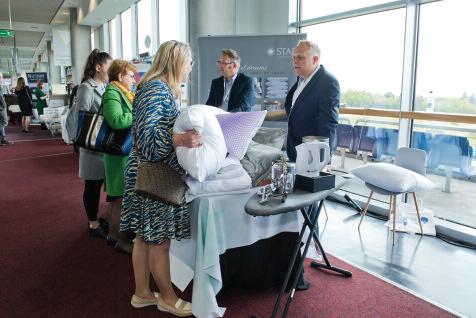

A large UK-based study published in the BMJ has suggested that antipsychotic drugs carry greater risks of serious health conditions than previously thought
These drugs are sometimes prescribed to manage severe dementia symptoms including agitation hallucinations and delusions However previous evidence of harms has led to efforts to restrict their use
Despite these warnings their use increased during the COVID-19 pandemic
The new research is a collaboration between the Universities of Manchester Nottingham Edinburgh and Dundee Researchers examined health records of over 150 000 people in England over 50 years old with a dementia diagnosis
Prof Darren Ashcroft, the study’s senior author, from the University of Manchester said: In recent years it has become clear that more people with dementia are being prescribed antipsychotic drugs, despite existing regulatory safety warnings
“It is important that any potential benefits of antipsychotic treatment are weighed carefully against the risk of serious harm and treatment plans need to be regularly reviewed in all health and care settings ”
Commenting on the findings Dr Sheona Scales Director of Research at Alzheimer’s Research UK, said the study reinforced existing evidence These concerns have been known for some time Alzheimer s
Research UK-funded researchers revealed dangers of antipsychotics in 2008 which raised concerns about their use and prompted government intervention to reduce their prescription ”
The harms previously associated with antipsychotics include an increased risk of conditions such as pneumonia and stroke when given to people with dementia But there has been less evidence around other conditions, such as heart failure and kidney injury
The study found that over a ten-year period people with dementia who had been newly prescribed an antipsychotic drug were more likely to have stroke blood clots heart attack heart failure fracture pneumonia and kidney injury compared to people who were never prescribed antipsychotics
However these harms need to be balanced against the fact that severe dementia symptoms such agitation and confusion can pose significant challenges for people living with dementia and those that care for them
“Treatments that can help manage these symptoms are essential for a better quality of life but options are currently limited, and in certain circumstances antipsychotics can be used to treat severe symptoms said Scales
“These new findings suggest that these risks may be more severe than previously understood which is particularly con-
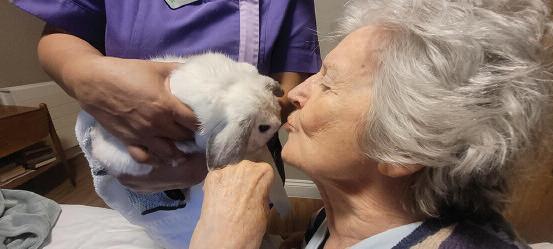
Although Cotton lives on the Memory Loss floor she brings smiles to all our residents including regular trips to ones that are very poorly and bedbound The toddlers from Barnet Hospital Nursery also enjoy spending time with her on their fortnightly visits and the staff also benefit from her calming nature and pleasure that comes from spending time
with animals
Cotton has her own Care Plan which details all her needs and helps make sure that they are all met she also has her own delicious food prepared by chefs plus all the treats she receives from our residents
Pet Therapy is often considered as a sensory activity however interaction with a friendly pet can help many physical and mental issues; It can help reduce blood pressure and improve overall cardiovascular health It can also release endorphins that produce a calming effect this can help alleviate pain reduce stress and improve your overall psychological state
cerning given the rise in their use during the pandemic
“With nearly one million people affected by dementia in the UK there is an urgent need for research to develop safer and more effective treatments This means medicines that can alleviate these symptoms and also address the underlying disease processes that cause dementia There’s been welcome progress recently, but so much work remains to be done
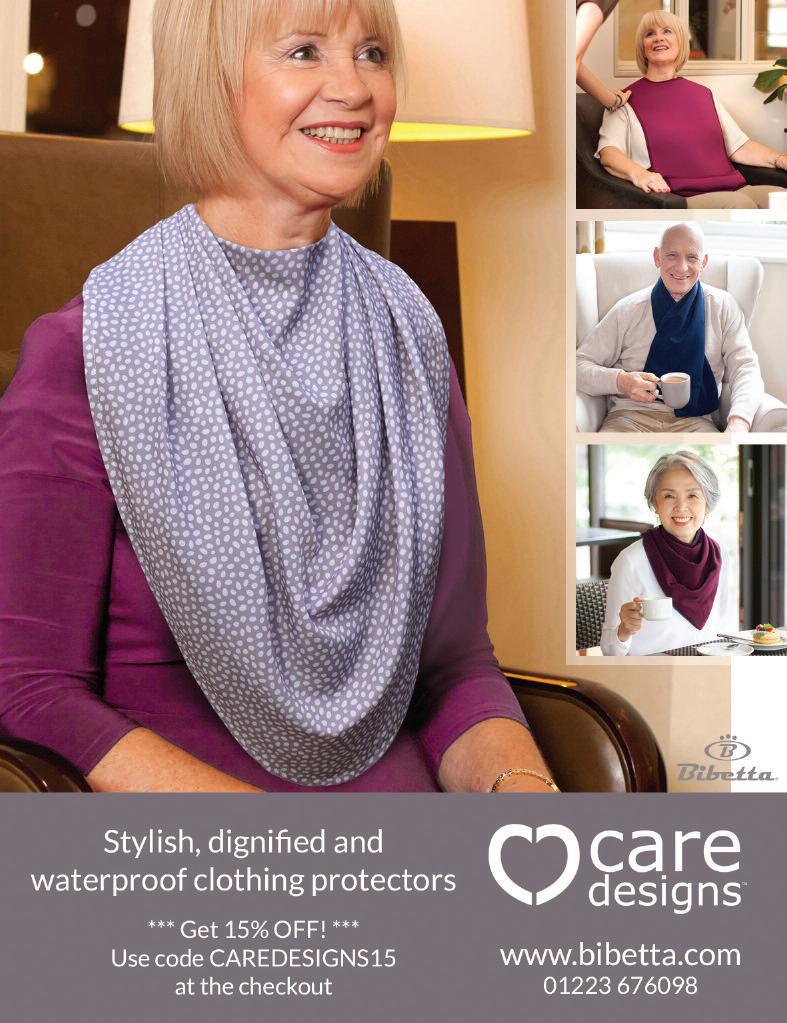


As care providers express concerns about the stress caused by Care Quality Commission (CQC) inspections, Carl MaySmith, a Barrister specialising in health and care at UK and Ireland law firm Browne Jacobson (www brownejacobson com), examines the issues and offers advice for operators
The National Care Association (NCA) has reported a ‘considerable rise in calls received following CQC inspections with conversations detailing negative experiences
In a letter to the CQC’s CEO Ian Trenholm it said there were deep concerns from members about the stress caused by inspector visits on care staff amid a recruitment and retention crisis while it accused the regulator of presiding over a culture that is ‘hostile at the ground level’
Issues raised by the NCA reflects what we have heard from our care home clients which cite the current inspection regime and culture as one of their primary challenges It mirrors recent more high-profile criticisms of the Ofsted inspection regime in education
The data suggests ratings have been adversely affected since the regulator has greatly reduced routine inspections and this has continued under its new inspection framework
The data suggests this is affecting ratings In the month to 22 April 2024, the proportion of care homes receiving requires improvement ratings was 41% while those rated inadequate was 24% Traditionally we would expect these to be about 18% and 1% respectively
In the NCA s letter it references comments from a care home manager about the gruelling nature of a recent inspection and the need for the utmost preparation
Our advice has always been to take a proactive approach to managing inspections and experiences of those on the ground suggests this has never been more critical
The CQC s refreshed assessment framework was introduced this year as part of its new strategy launched in 2021
One of the key changes in the strategy is the move away from reliance only on set-piece inspections to regulate and rate providers
Inspections now generally take place in response to concerns with a broader set of data collected from services on a more regular basis, allowing ratings to change more responsively
The rationale behind this it said at the time of the strategy launch was to reduce inconsistencies that can arise from over-reliance on the view of a lead inspector on a single day
In reality routine inspections have greatly reduced Where inspections are carried out they are generally to address concerns and providers should expect these will be challenging
It is often said that a CQC inspector s first impression can set the stage for a whole inspection process
This first impression may well have been formed before a visit commences where potential risks have already been identified
Our advice to providers is to ensure they are proactive in mitigating potential CQC concerns when they arise to avoid being on the back foot from the moment an inspector walks through the door
With this in mind it’s essential to bring frontline staff who will interact with the CQC up to date with the new assessment framework which has replaced hundreds of lines of enquiry with fewer than 40 areas across the five domains: safe effective caring responsive and well-led
It s also important that staff understand inspectors’ priorities, which will likely focus on services where there are concerns and are of current CQC focus recently including restraint fire safety and duty of candour
Many providers particularly larger organisations will carry out self-assessments and these should also be reviewed to mirror the new framework
As part of the increased focus on services with concerns greater emphasis has been placed on observations of care such as medicine rounds
Providers are now expected to share information such as policies, procedures and safety records in advance of rather than during visits
Losing the opportunity to explain any issues to an inspector in person means managers must be prepared to do this on a remote basis
Frequent reviews of paperwork will enable them to identify any potential red flags on the horizon so they can provide context and mitigation when requested to provide information
Another key priority for the CQC is to gain a greater understanding of people s experiences of care
This has not yet been matched with a methodical approach to collecting feedback, with inspectors increasingly contacting service users their family members staff and even commissioners before and after inspections take place to gather this intelligence
They are asking specific questions about individual concerns raised during visits and the result is one negative account can have a disproportionate effect on inspection outcomes
It s therefore vital that providers open positive communication lines via regular engagement with these stakeholders
Collecting feedback is good practice anyway as it helps with internal quality assurance but in the context of inspections data can provide evidence to challenge conclusions based on individual complaints It enables providers to demonstrate they are listening and addressing issues
If an employee feels an inspector s question about staff capacity is their first opportunity to have a voice they may vent on this and other issues But if the provider has adopted a proactive approach to gathering feedback and taking action they are more likely to support their employer
Along with keeping on top of everything internally providers should keep abreast of what s happening in the external environment via a proactive relationship-building strategy
With the CQC now assessing local authorities and soon integrated care systems commissioners are also under the inspection microscope Providers should be aware of conversations that could be taking place between commissioners and inspectors to understand how this might affect them
Being proactive in communications with local inspectors is integral to avoid any ‘reactive inspections’ that could be prompted by concerns raised by various parties
More broadly as the sector gets to grips with the CQC’s new approach to inspections, much can be learned from peers
Keeping in touch with other providers whether directly or via forums such as Browne Jacobson’s Health and Care Connect helps with understanding best practice and shared challenges to avoid making similar mistakes
In an exciting development for green-fingered enthusiasts, Cranford Care Home in Aberdeen part of Larchwood Care has reintroduced it s much-loved gardening club for 2024 bringing together residents staff and family volunteers to cultivate beauty and joy in the courtyards
After a long-awaited break in the weather the residents of Cranford Care Home seized the sunny day to begin tidying up their courtyards preparing the grounds for a blossoming array of plants and flowers The initiative not only aims to beautify the surroundings but also to enrich the lives of residents through engaging nature-based activities
Cranford Care Home manager Colleen Reid expressed her enthusiasm about the project saying: We are thrilled to see our residents so excited about the gardening club It's wonderful to watch them take ownership of the project, deciding on the plants and flowers that will soon brighten our courtyards This is truly a testament to the vibrant community spirit here at Cranford "


One of the residents Violet Allan shared her joy: "I used to love gardening in my own garden and it s lovely to get back to it with friends here It s not just about the planting; it's about the people the laughter and the fresh air Today was a perfect day to start our garden adventure!"
The gardening club is part of a broader initiative by Cranford Care Home to promote active lifestyles and mental well-being among its residents through outdoor activities and communal engagement The project received a warm reception, with several family members volunteering to assist with the inaugural setup
We are immensely grateful to the family members who came out to help us today added Colleen Reid "Their support makes all the difference, and it’s heart-warming to see such wonderful collaboration between our residents and their loved ones
Cranford Care Home looks forward to a year of growth - both in the garden and within its community
Westland Horticulture, home to brands such as Big Tom Boost Resolva Unwins and Kent & Stowe is excited to announce the New Horizon Fund that will support community garden projects across the UK and Ireland in 2024
Is your local care home’s outdoor space in need of some love and care to help ensure its accessible to all?
At Westland, we believe everyone deserves to get closer to nature and a thriving garden has a vast array of physical and therapeutic benefits, whatever your level of mobility
From awakening the senses of touch, sight, and smell with an abundance of thriving plants and flowers to simply sitting in the fresh air surrounded by beauty and wildlife everyone deserves to enjoy an outdoor space
The New Horizon Fund aims to create a greener future for all and will support community garden projects, from schools, allotments, hospices, and care homes, across the UK and Ireland The funding will comprise of a collection of gardening essentials from Westland from compost seeds tools plant feed and much more, to the value of £1,000 or Euro equivalent Each prize bundle will be individually created based on the project s needs to help them transform their space
HOW TO GET YOUR LOCAL CARE HOME INVOLVED
If your local care home could benefit from receiving a donation from Westland s New Horizon Fund to help its outdoor space thrive, nominate them at www gardenhealth com/new-horizon-fund
There will be multiple prize draws throughout the year in March June and September with at least five
bundles being awarded at each stage, so there s plenty of opportunities for your local care home to be gifted a bundle The sooner you enter, the
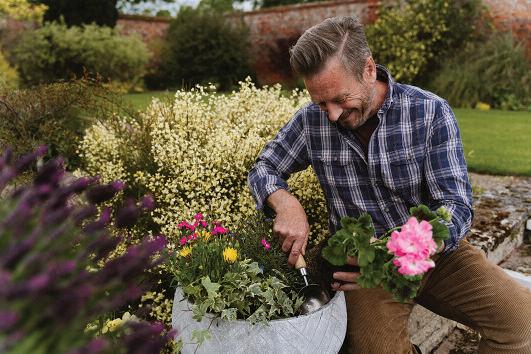

The Highland Marketing advisory board discussed social care and technology a year into the Covid-19 pandemic Three years on there has been progress and set-backs leaving plenty of questions for an incoming government
The Highland Marketing advisory board last discussed adult social care in April 2021; a year into the Covid-19 crisis that had demonstrated its value – while highlighting some of its challenges
The sector had gone into the pandemic facing a chronic shortage of funding and staff, while the Covid-19 response highlighted that care homes and domiciliary providers lacked wi-fi, electronic health records, effective communications, and monitoring technology
When Boris Johnson took over as prime minister he promised to “fix” the crisis in social care once and for all In December 2021 as his government reluctantly prepared for its third lockdown it issued a ten-year vision for the sector
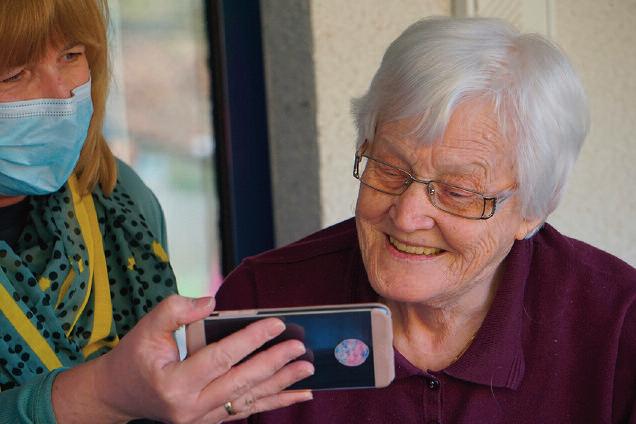
People at the Heart of Care came with a headline pledge that people would no longer need to sell their houses to fund their care and that £1 5 billion would be invested in housing workforce and technology Two years on the Commons public accounts committee found this has fallen well short of a fix
Days before the advisory board revisited its discussion of social care and technology the PAC warned the promised funding had been scaled right back and the government no-longer has a roadmap milestones or targets for the sector after March 2025
Meanwhile, adult social care now accounts for as much as 70p in every pound of council funding, pushing an increasing number towards bankruptcy Brexit has not helped vacancy rates, which have reached 152,000 Providers are struggling with the cost of fuel, heating and food Yet, almost inevitably demand continues to rise
There have been some positives in the past three years Integrated working is still on the agenda even if progress has been slow with NHS England and integrated care systems focused on finances and waiting lists
The government has launched a plan to develop the domestic care workforce with a new accredited qualification and a career structure with defined job roles And there has been some progress on digital In fact Claire Smout head of digital skills at Skills for Care told the advisory board that the £100 million People at the Heart of Care earmarked for digital skills and technology is one of the few pots of funding that have not been raided and are still being spent
The money has gone into three areas starting with digital social care records Smout said Care Quality Commission figures suggest “about 67% of care companies now have a digital social care record of some sort ”
Money has also gone into ‘digital readiness’ such as wi-fi provision, cyber security, digital skills and training, and into care tech pilots, ranging from using AI to help with scheduling, to installing Alexa and other voice-activated devices in people’s homes
Even so there s a lot left to do There are 18 000 social care providers in England and while there are some large chains many are small and simply cannot afford technology We ve got small providers who cannot afford to put the infrastructure in place for digital social care records Smout said
They struggle to find investment for the wi-fi or the tablets never mind the licences So over the next two to three years there s likely to be a cross-over where we have some care providers that are paperbased and some that have moved on electronically
At the same time the CQC doesn’t have a definition for digital social care record so it s not clear what systems that 67% of providers have deployed Smout’s colleague and advisory board member Jane Brightman said an assurance framework has been developed to address this and drive-up quality
This will be issued against a background of policy activity to address data quality and interoperability An updated Care Data Matters strategy has been issued to make sure data can be captured once and used many times
While days after the advisory board meeting the DHSC issued a prior information notice for an interoperability platform and services to share data with health providers and shared care records
On the training and skills front Skills for Care has been commissioned to develop a Digital Skills Framework for its sector Smout said it covers seven areas ranging from ethics to cyber security and data management
Each area sets out the skills that anybody working in social care should have while another sets out the skills that those in more senior positions require The framework has a learning and development framework attached to it with a free e-learning platform holding videos and other resources and a database of training
M-Resourcing are delighted to announce the appointment of Dan Ashenden to lead our M-Resourcing service with effect from 1 December 2023
M-Resourcing offers a multi-faceted approach to solving complexresourcing problems facing the care sector Whether you facespiralling staffing costs and pressures, or simply require a newapproach to managing this critical area for your organisation, ourcomprehensive resourcing solution reduces costs brings controland allows you to plan for the future with confidence
We knowfrom talking to our clients that managing their resourcing costs isstill a key priority and this important appointment underlines ourcontinuing commitment to the sector

Christoph Marr CEO of Marr Procurement Dan is a highly-capable leader and has incredibly valuable experiencefrom his years in the care sector managing and delivering complex temporary labour
providers
The framework has been developed with the sector Smout stressed It s very interactive and it s not designed to sit there gathering dust Nor is it being developed in isolation from other workforce initiatives The DHSC is working on a strategy for digital data and technology (DDaT) staff
While Skills for Care has been tasked by its sector with developing an adult social care workforce strategy as the government has not commissioned one
Brightman said the strategy which should be published in July, will cover one-to-five years and five to 15 years, so it can address immediate challenges – such as the collapse in apprenticeships – and longer-term ones – like creating new digital roles to support new ways of working HOW FAR WILL THE MONEY STRETCH?
With all this going on it s clear the digitisation of social care still has some way to go And advisory board members questioned whether there is the money to do it
Neil Perry a consultant and former acute trust chief information officer noted that £100 million is just 5% of the money the NHS is putting into its frontline digitisation programme to implement and upgrade electronic patient records
The breadth of social care the number of places in which it works it can t be any simpler than the NHS surely?” he mused “So the question is how is that £100 million going to stretch?”
“The positive is that social care is a greenfield ” Brightman said “We haven’t got some of the structural problems with technology that the NHS has got “We’re not years down the line with long, unwieldy contracts with our suppliers ”
Having said that, she acknowledged that with 18 000 providers to cover, the government has effectively said: “we can’t do all of it” and: “we can only put a little bit in ” And that will run out at the end of the threeyear spending review period next March
Andy Kinnear another consultant who formerly worked for an NHS commissioning support unit admired how far that little bit had been stretched You re getting these dreadfully meagre crumbs off the table so the fact that you are still smiling and so positive is an incredible achievement he said
But in the absence of funding he wondered what other drivers are available Smout said a lot of impetus will come from the Care Quality Commission which has issued guidance suggesting providers will need to adopt digital social care records to remain good or outstanding ; and instructing them to complete the Data Security Protection Toolkit
Skills for Care is also looking at how it can drive the skills and training agenda by building these into other frameworks “The new care qualification for example will be available for new staff so how can we make sure digital skills are embedded into that – and into some of the other mandatory training that people have to do?” she asked
Both Brightman and Smout stressed that finding practical solutions is essential to keep ministers and Treasury officials on board “What I have learned is that the government just doesn’t listen if we go in cap in hand saying social care is a nightmare and you need to fund this this and this Brightman said So what we re trying to do is come up with positive solutions they can work with
James Norman a former acute trust CIO who now works on the supplier side accepted the point but wondered if things would change with a change of government What about Labour he asked: Do they give any indication of funding this?
Brightman said the party seems to be interested in a National Care Service but its immediate priorities are likely to be a new offer on pay to attract and retain more staff and further investment in digital
On top of everything else discussed Kinnear suggested the party should look for ways to commission new digital models of care and to put care tech into the hands of users so they can access some of the self-serve functions that have become common in banking, shopping, and other sectors
“Health has been slow and clumsy to move in that direction, but there must be opportunities to rethink social care in the same way,” he argued Brightman and Smout said some councils are already talking about a “frank conversation with citizens” about how to share responsibility for health and social care TIME TO TACKLE FUNDING
Whatever Labour decides on structure workforce and digital it will need to address funding After all Ian Hogan CIO at a community and mental health trust pointed out social care is an investment
A failing social care sector leads to delayed discharges from hospital makes it harder for people to return to the workforce and means people live less full lives than they could Or as he summed up: Poor social care leads to poor healthcare which has a direct knock on effect on all of us
David Hancock a consultant who previously worked for major EPR and SCR companies agreed In 2015 [former NHS chief executive] Simon Stevens said that if he had more money he would put it into social care he said It didn t happen then – but it needs to happen now


potential treatment to manage symptoms better helping them to maintain their independence and quality of life for longer It also enables people and their families to plan ahead better and may help the health and care system save costs in the long-term High-quality dementia diagnosis and care involves many different parts of the health and social care system working together effectively The research finds that ICSs are helping to create the conditions for better collaboration between different parts of the health system and there are pockets of improvements in dementia diagnosis as a result For example where partners within a system are working together to prioritise the improvement of diagnosis rates and creating a shared delivery plan to do so; or where they are sharing learning and spreading good practice across their system The authors found key enablers of improvement include efforts to strengthen relationships between primary care memory clinics and other services and the introduction of new extended roles for GPs (for example to improve dementia diagnosis in care homes)
However, the authors also highlight that there are more opportunities to be realised For example, where it is not already happening, organisations within an ICS can work together more closely to shift resources towards prevention and early diagnosis, and to coordinate training opportunities for GPs and other clinicians on dementia diagnosis More regular and meaningful engagement with the public would help to destigmatise the condition and unpick the barriers to access experienced by underserved communities, allowing for
earlier identification of symptoms and helping to reduce inequalities in diagnosis
There is also more to do to increase public awareness of the support options available once someone has received a dementia diagnosis the research finds This will require ensuring adequate resources for dementia support services as a lack of awareness or access to support can prevent people from seeking a diagnosis
With the health and care system in England under severe pressure, ICSs face significant challenges when striving to improve dementia diagnosis Most of the recent progress of dementia care has its roots in partnerships built over several years before ICSs were given statutory powers two years ago and the research found that there can still be poor links between the various parts of the system with variation in ownership leadership and prioritisation at local level The authors recommend that the government and national bodies must ensure that national policy and accountability arrangements help to promote the local partnership working which lies at the heart of successful ICSs, and also that ICSs are provided with the support they need to test and scale up learning from new approaches to dementia diagnosis
Sally Warren Director of Policy at The King’s Fund said: ‘ICSs were created to bring about whole system improvements for the treatment of conditions such as dementia so that people can have high quality coordinated care It is good to see that there is evidence of this happening in some areas and that ICSs can be effective vehicles to drive this forward when their potential is utilised fully When ICS partners come together with a shared plan, cross-system leadership, a culture of collaboration, and a goal of addressing inequalities, they can successfully help people to live better and manage their complex health conditions
With an ageing population it is possible that the landscape of dementia diagnosis and care may change significantly over the coming years and there is a real risk that some ICSs may lack capacity to plan for the future at the same time as responding to immediate pressures In the long-term ICSs will need further support from the government NHS England and other national bodies to be able to build capacity for testing new approaches and spreading successful innovations and ways of working for diagnosis and support, as well as to strengthen collaboration between system partners ’
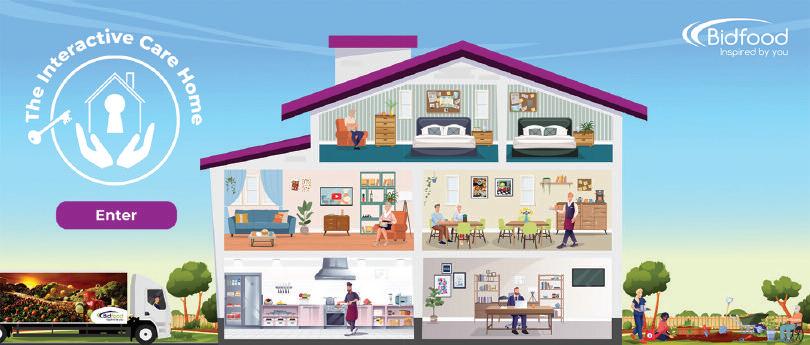

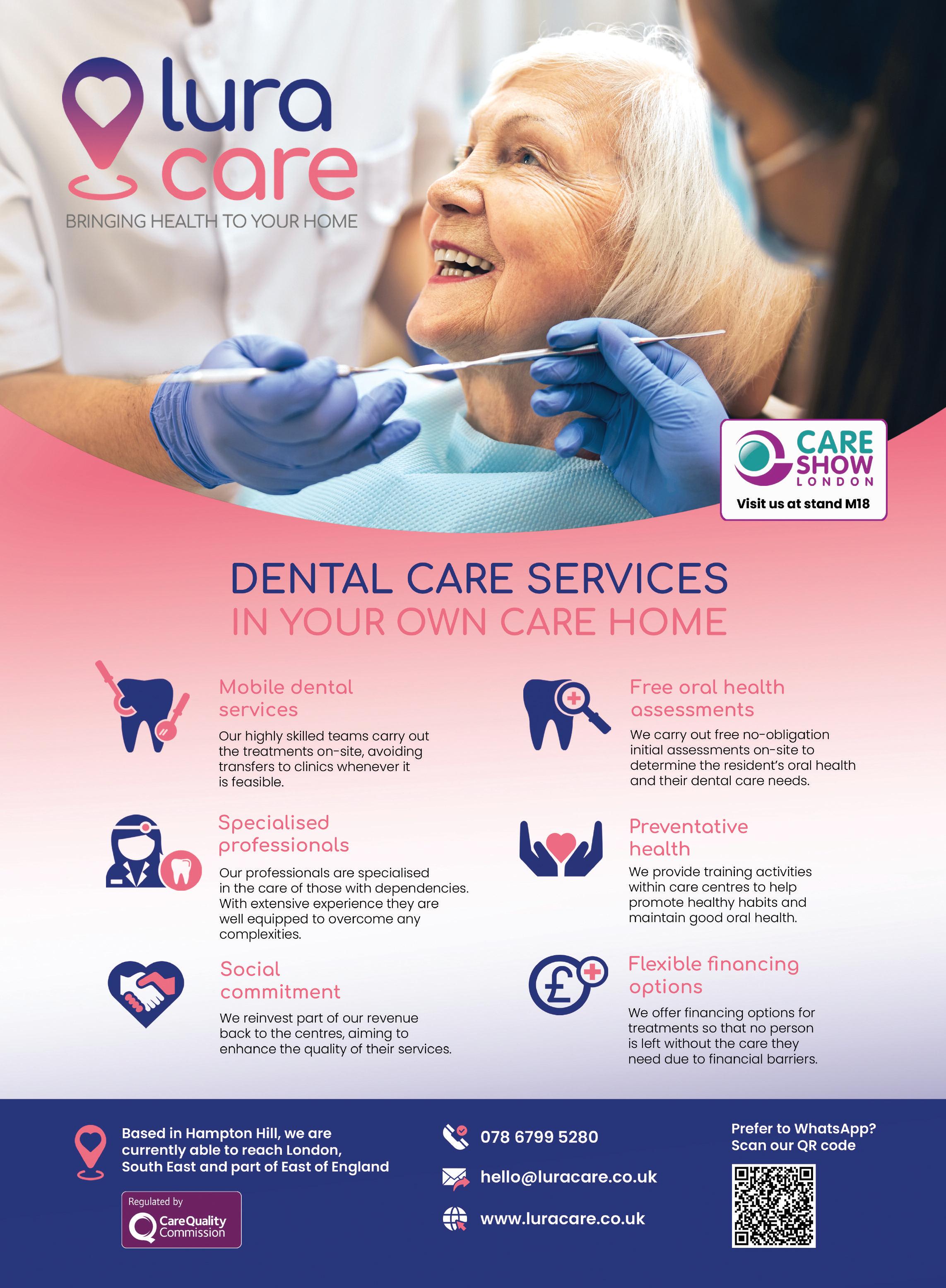
Derbyshire County Council is to consider proposals to consult on the future of residential care homes and day opportunities for older people which could lead to the closure of up to 11 care homes and eight day centres as part of a shift to a new model of residential and day care
The model would focus on short-term enablement for older people and specialist services for people with dementia and their carers, offering a mix of specialist dementia care and respite care to support their carers including integrated and flexible specialist dementia day services Cabinet member for adult care, councillor Natalie Hoy said: “People tell us that they want to stay in their own homes for as long as possible and with the right help and support they can This has led to a decline in demand for traditional residential care
Currently one in 11 people in Derbyshire over 65 are living with dementia with the number set to grow This means there’s a growing demand for specialist care services for people with dementia, the report adds
With a growing number of people in Derbyshire living with dementia we need to focus our resources on having the right options to support them and their carers which would give us the resources needed to meet demand while ensuring adult care and health is sustainable so we can continue to support people who need us most ”
The cabinet will be asked to consider consulting on two options:
OPTION 1
Retain 7 care homes, transforming them into specialist dementia care centres Five have on-site day centres This model would offer a flexible consistent offer of short-term enablement long-term care for people with dementia and respite day and night for carers of people with dementia Retain Ada Belfield, Belper; Florence Shipley Heanor; Lacemaker Court Long Eaton; Meadow View Darley Dale; Oaklands Community Care Centre Swadlincote; Staveley Centre Staveley and Thomas Fields Buxton
Cease to operate 9 care homes: Briar Close Borrowash; Bennerley Fields Cotmanhay; Castle Court Swadlincote; The Grange Eckington; The Leys Ashbourne; New Bassett House Shirebrook; Rowthorne Swanwick; Thomas Colledge Bolsover; Whitestones Chapel-en-le-Frith
developed following a new study looking at the benefits of developing a Men s Shed group within a hospice environment
A Men s Shed represents a physical space where a group of men can meet, organise, and participate in social activities and talk to others who are in a similar situation to themselves
Historically hospices have struggled to reach men with an illness they are likely to die from or those with a partner at the end of life who often then find themselves alone after many years of living with someone
The study, conducted by the University of Warwick and funded by Marie Curie investigated the ways a Men s Shed could promote the health and well-being of men who might otherwise avoid traditional health services
The researchers found that the Men’s Shed was an important place for men who needed support when dealing with issues related to the end of life However of over 200 hospices in the UK only five have a Men s Shed group The toolkit is designed to help hospices quickly and easily set-up this vital resource
Cease to operate 8 day centres: Blackwell Day Centre, Blackwell, Bolsover; Ecclesfold Resource Centre, Chapel-en-le-Frith; Fabrick Day Services Clay Cross; Hasland Resource Centre Chesterfield; Jubilee Centre New Mills; Queen s Court Fairfield Buxton; Shirevale Resource Centre Shirebrook and Valley View Day Centre Hillstown Bolsover OPTION 2
Retain 5 care homes, transforming them into specialist dementia care centres Three have on-site day centres This model would offer a flexible, consistent offer of short-term enablement, long-term care for people with dementia and respite day and night for carers of people with dementia Retain Ada Belfield Belper; Meadow View Darley Dale; Oaklands Community Care Centre Swadlincote; Staveley Centre Staveley; Thomas Fields Buxton
Cease to operate 11 care homes Briar Close Borrowash; Bennerley Fields Cotmanhay; Castle Court Swadlincote; Florence Shipley Heanor; The Grange Eckington; Lacemaker Court Long Eaton; The Leys Ashbourne; New Bassett House Shirebrook; Rowthorne Swanwick; Thomas Colledge Bolsover; Whitestones Chapel-en-le-Frith
Cease to operate 8 day centres - as in Option 1
Councillor Natalie Hoy said: “We’ve always prided ourselves on being a well-managed council but like all other councils across the country we’re facing increasing financial pressures that are outside our control
“And with demand for adult social care support rising, it means we have to consider how we continue to deliver the services we’re required to
“This is not a position we want to be in, but with the pressures on budgets beyond our control we need to focus our resources where they’re needed most ”
Councillor Hoy added “I d like to reassure everyone especially our residents and clients their families and carers that these are proposals only and if Cabinet agrees to consult no decisions would be made until everyone s views were taken into account
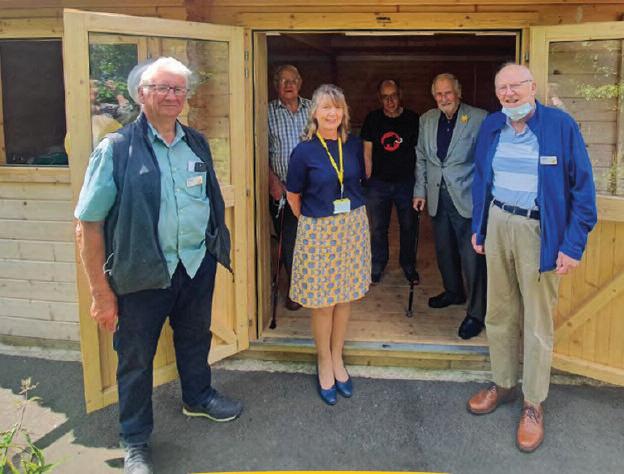
Paul Whelan (67) from Sheldon West Midlands was referred to Marie Curie following a diagnosis of Motor Neurone Disease in 2015 and is a founder member of the Men s Shed at the Marie Curie Hospice, West Midlands
He said: “When I first came to the hospice there was no designated space or group specifically for men to talk about their experiences We originally met in the hospice but in 2020 we had raised enough money for our own space in the grounds of the hospice
“Men who are living with a terminal illness or grieving can come to the shed to share their experience knowing that others in the group will know exactly what they re going through
Look around and you’ll see plenty of companies offering to get the right suppliers for your business What we bring to the table is a friendly, personal approach rooted in proven experience and expertise We don t just deal in services – we build connections between people At Added Value Enterprises we re a committed team with a passion for connecting businesses with the right suppliers

Partner with us, and we’ll seek out the best options for your business in a dynamic and crowded marketplace We ll also review your existing supply chain gaining you immediate savings and new efficiencies as well as supporting you with PURCHASING SOLUTIONS FOR HEALTHCARE
Social care organisations have a lot on their plate without a supply chain review getting in the way We collaborate with social care organisations and care homes across the country taking care of the timeconsuming details and achieving the good value they deserve With a robust ethical highly traceable supply chain we deliver
The group who meets every Tuesday has 14 members which allows the men to speak freely
Paul goes on to say: “Men’s Shed has made an enormous difference to me If I didn t have the Men s Shed I d be lost
Rachel Perry, study co-lead and Research Nurse at the Marie Curie Hospice West Midlands said: Men s Sheds represent more than just physical spaces Our research found that our members found companionship, practical and emotional support with others who were experiencing similar issues to themselves
“Many members described how they had become more isolated from their wider friendship groups when they were bereaved or as their disease progressed and described how attending and being a member of the Men s Shed group helped to lessen the feelings of being alone
“Some of the members explained that attending the Men’s Shed motivated them and encouraged them to think about their physical wellbeing This included the benefits of getting out of the house as well as the activities undertaken at the group along with the gains from caring for themselves that came from improved mental and emotional wellbeing
Dr John I MacArtney, study co-lead and Marie Curie Associate Professor, University of Warwick goes on to say Members described the benefit of talking about issues when they came together at the Men s Shed that they did not feel able to share with others, including family, for fear of upsetting them
It is a social space where members came to chat and take part in a range of activities But it also provided a way to support each other emotionally as they could appreciate and understand how other members felt
It was clear to us that a Men s Shed can be an essential part of hospice services By developing this toolkit we hope more hospices will set up a Men’s Shed and recognise it as a crucial part of supporting men who are living with a terminal illness or have been affected by bereavement
expert food beverage and non-food purchasing solutions that save time and money That means more time to focus on what matters like supporting patient wellbeing with exceptional quality produce
Let s achieve new efficiencies today
YOUR SOCIAL CARE PURCHASING PARTNER
Social care organisations choose us as their partner because we know the requirements of this challenging field We deliver a lean robust supply chain that works for your
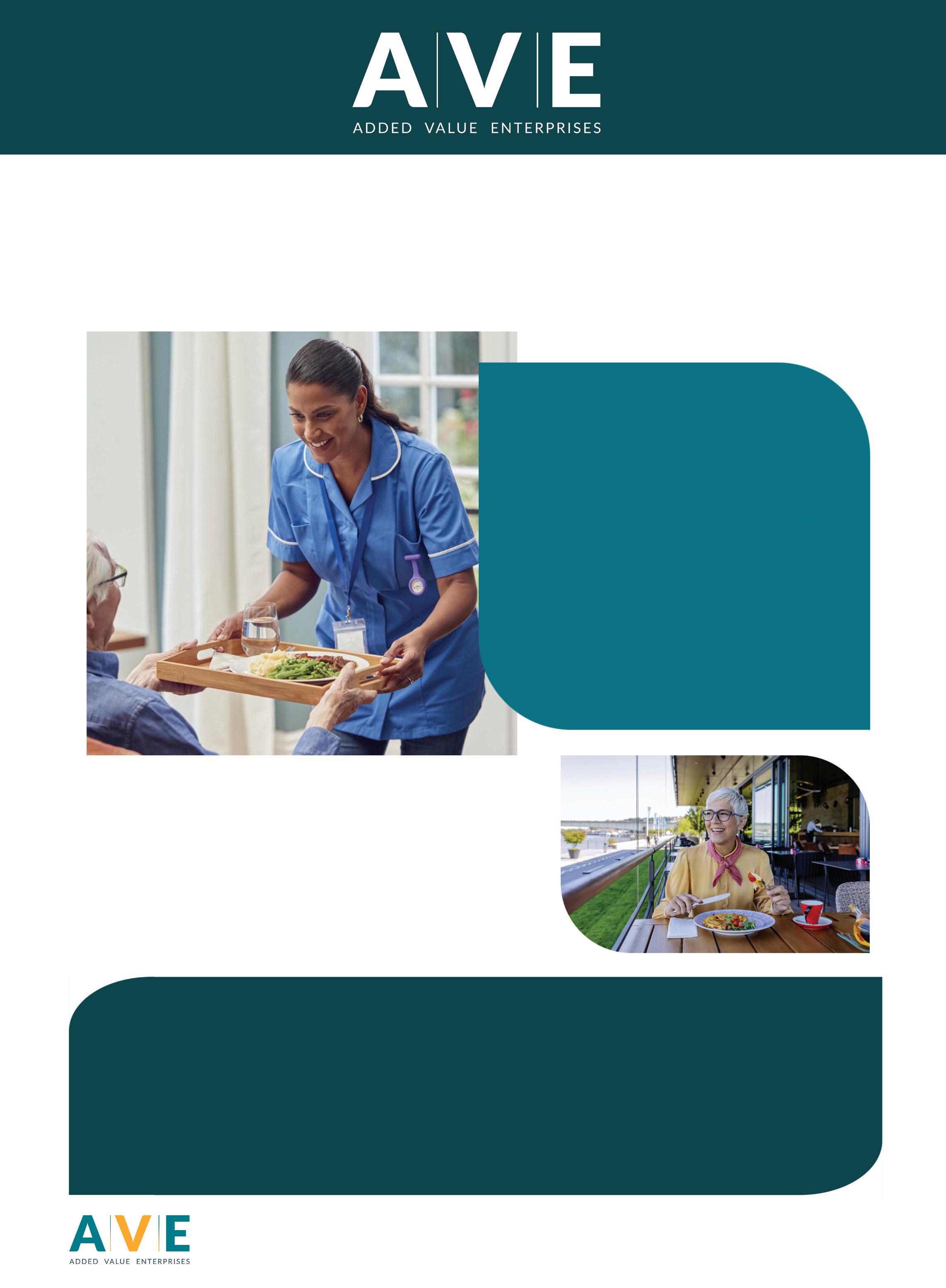
Social care organisations have a lot on their plate, without a supply chain review getting in the way We collaborate with social care organisations and care homes across the country, taking care of the time-consuming details, and achieving the good value they deserve
With a robust, ethical, highly traceable supply chain, we deliver expert food, beverage, and non-food purchasing solutions that save time and money That means more time to focus on what matters, like supporting patient wellbeing with exceptional quality produce
Let's achieve new efficiencies today
Social care organisations choose us as their partner because we know the particular requirement of this challenging field We deliver a lean robust supply chain that works for your patients and people
In a busy market, we cut through the obscurity and complicated language to find the deals that matter to you, achieving the quality you deserve, at prices you didn't know were possible
How's that for a healthy supply chain?
We know how important sourcing is to social care organisations and care homes You need to know where your food, beverages and non-food are coming from, but that often means paying more than you should
At AVE, we don't believe that there should ever be a choice between ethics and value We offer sustainable sourcing that is good for the planet and your bottom line
Achieve lean robust food and non-food supply for your social care business or care home Our purchasing experts have spent years working in the social care sector identifying the particular needs of people in this challenging field and delivering on time every time Sustainable produce better prices and the quality you deserve
inspire healthcare chefs and catering staff with quality menus and recipes that your patients will love Our food management consultants have worked with health and social care organisations and care homes across the UK, crafting bespoke menus that deliver on price and taste We ll even help you navigate the tricky territory of special diets and allergens with ease
Catering can be tricky to go at alone Why not partner up? Trust us to lend a specialist hand across every aspect of your food operation, and guarantee the best results - safety and sustainability assured
A St Helens Matron, who has successfully run St Bartholomew s Court Nursing Home for nearly 25 years has won a lifetime achievement award
St Barts Elaine Allison described as selfless by colleagues was recognised at the Our Health Heroes Awards ceremony held in London
During her decade spanning career as Matron Elaine has overcome numerous challenges, not least being diagnosed with bladder cancer and suffering a bereavement at the height of the pandemic in 2020
Despite all the odds Elaine continues to have the energy and commitment of people half her age
Much of the care home’s staff has been with Elaine the entire time she has been Matron, which is unusual for the sector And testament to the bond Elaine shares with her colleagues a number St Barts’ staff have even brought their own relatives
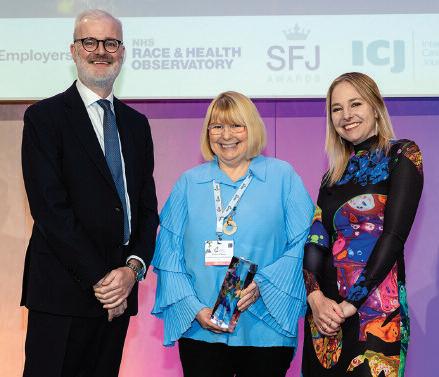
to be cared at the home as they know the strong leadership and clinical supervision that the team receives
Receiving her award Matron Elaine said
After a 14-year career in district nursing I moved to the nursing home care sector
I’ve gone to work to enjoy work it’s been a vocation wherever I’ve worked And the 25 years at St Barts have been the best years of my life and has given me so much
It s been nice to be around residents and to give them the best quality life in the last years of life so too the staff that want to grow and develop and want to achieve so much I m humbled that people voted for me and to win this award
The Our Health Heroes Awards is sponsored by NHS England NHS Employers and NHS Shared Business Services To find out more visit:
www skillsforhealth org uk/awards
In a recent visit to The Hall care home in Thornton-Le-Dale Kevin Hollinrake, MP for Thirsk and Malton, congratulated the staff on becoming one of the first services in the country to receive the new British Standard for Adult Residential Care – BS8606:2019 This prestigious recognition highlights the home’s commitment to maintaining high standards in adult care The Hall which supports up to 54 residents was rigorously inspected by Care Inspections UK (CIUK) the UK s only registered and accredited care home inspection body Following the inspection, The Hall was awarded a certificate of compliance with BS8606:2019 a standard that specifies requirements for providing support, personal, nursing, and/or specialist care within a residential setting Located in a beautifully restored historic building at the heart of the Thornton-Le-Dale community The Hall offers both residential and respite care to older adults particularly those living with dementia and maintains close links with the local charity, Dementia Forward

The care home is also rated good across all five areas of inspection by the Care Quality Commission (CQC)
Kevin Hollinrake, MP for Thirsk and Malton said: “The new standard is great and I m delighted that it s happened in my constituency
“Social care is really important and the standards need to be as high as possible so it’s great to see new standards being set here at The Hall ”
Chris Lane chairman of Park Lane Healthcare expressed his pride in the team s accomplishments: “We’re delighted that The Hall has excelled in two objective independent assessments from nationally recognised industry bodies Being acknowledged as a good service by both CIUK and the CQC is a testament to the hard work of the staff particularly the managers To be one of the first in the UK to be recognised as compliant with BS8606:2019 underlines the seriousness with which we approach our care responsibilities at all levels within our organisation ”
Kevin Groombridge chief executive of Care Inspections UK added Maintaining excellent standards is key to homes providing safe and appropriate care to its residents The team at The Hall demonstrated the standards required to attain BS8606:2019 and took on board any constructive feedback we provided

While Woodpeckers in Brockenhurst welcomed friends from Kingfishers in New Milton, there was similar gentle rivalry as Amberwood House in Ferndown took on visitors from Bourne View in Poole The inter-home fun inspired by National Scrabble Day lasted several hours and featured a sweepstake so non-players could feel involved by guessing the number of words the teams achieved in each game
At Amberwood House, staff reflected the theme of word play by dressing up as something beginning with the first letter of their name Companionship Team Leader Kirsty Richmond-Cole was a Kite, Clinical Lead Hanna Rehbein was a Hot Dog Home Manager Diane Nicholls was a Dragon Nurse Anika McQuirk was Alice in Wonderland and Maintenance Manager Christian Blanch was Clark Kent unveiling a Superman top from under his shirt
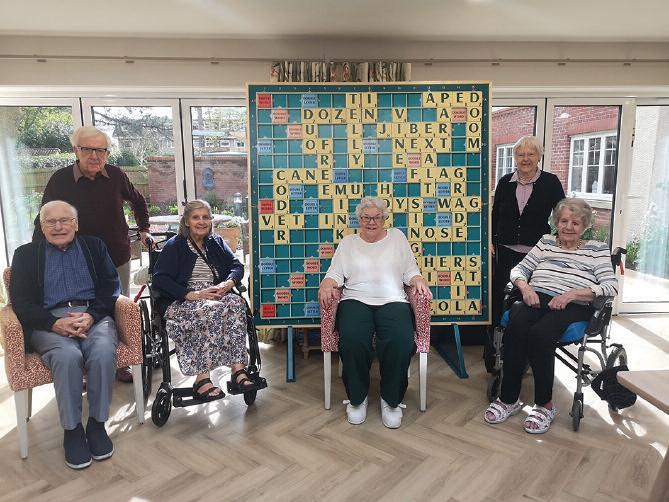
Kirsty said: “We decided to dress up so residents could have a good laugh and join in with the celebrations even if they had decided not to play We did have some strange looks and one or two belly laughs
Resident Don Cussen asked us if we had lost our marbles!”

The Bourne View team - Harold Faircloth, Wendy Barnes and Peter Prior - arrived at Amberwood House just before lunch taking a stroll around the garden and enjoying fish and chips before sitting down for the competition
In the end Amberwood House put up three teams itself with residents Marjorie Hutchings, Rita Bryant and Noreen Hewitt having a closely fought match with Harold Wendy and Peter Kirsty said “There were some clever moves and a few challenges on words and Marjorie Rita and Noreen jumped into the lead But Harold Wendy and Peter refused to give in and made a word score of 41 which enabled them to go in front As it went on and with a final push from Marjorie Rita and Noreen Amberwood House cheered with joy as they cleared their rack with a fantastic move and won the game ”
Companionship Team member Sian Harris said: Over an hour and a half of playing and 75 words later, Jo’s team were the clear winners with 307 points against 239 Jo also won a prize for the longest word This prompted a lot of laughter as her word was ‘headstones’ One resident said “you have to laugh at these things even if it s dark humour!”
There was also National Scrabble Day fun with games between residents living at Colten Care’s Avon Cliff home in Bournemouth
National Scrabble Day is celebrated annually in honour of the game s creator an American architect called Alfred Mosher Butts who was born in April 1899 and came up with his invention in 1938






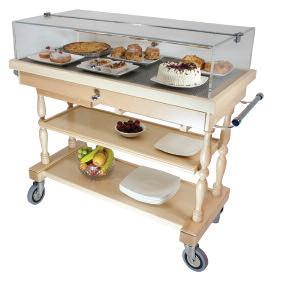





HC-One care homes across Britain have marked the annual campaign of Global Intergenerational Week which takes place 24th – 30th April 2024 celebrating all things intergenerational The campaign inspires individuals to embrace intergenerational practice and connects people of different generations through a variety of beneficial activities
At Brandon House Care Home in Coventry, West Midlands, Creative Mojo who are an arts and crafts organisation and Lady Bird Pre-school visited the home to join residents in making a poster in honour of Jamaican Reggae music artist Bob Marley
Both residents and the children really enjoyed spending time together and getting to know each other whilst keeping themselves busy in an arts and crafts painting session The residents and children enjoyed the activity and spending time together so much that the school has agreed to visit the home on a regular basis
Sheryl Davis Home Manager at Brandon House Care Home said:
“We were delighted to welcome Creative Mojo and Lady Bird Preschool to Brandon House Developing intergenerational relationships is very important The sessions help residents to build valuable connections whilst teaching and sharing their wisdom with younger generations
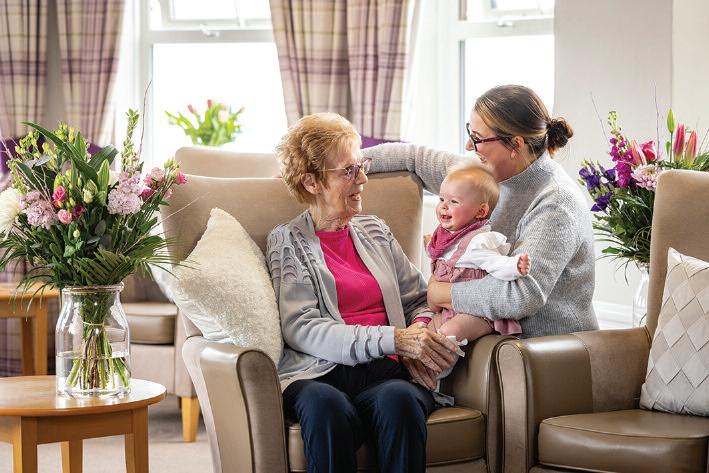
“We look forward to welcoming Lady Bird Pre-school back to Brandon House in the near future to continue to develop the relationships between the children and residents
At Meadow Bank Care Home in Preston Lancashire Wellbeing Coordinator Dawn Ward’s grandson Sebastian Taylor-Ward aged 16 months visited the home to bring a smile to residents’ faces Residents
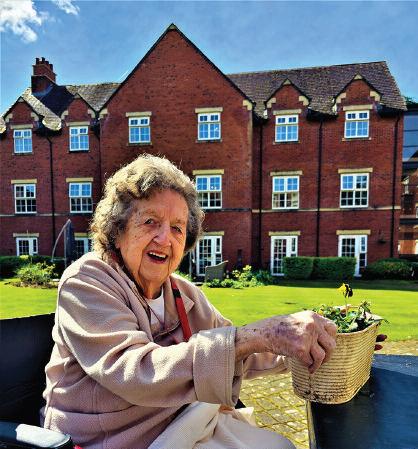
enjoyed meeting Sebastian giving him lots of cuddles and chatting to him Resident Edna Hall, aged 86 years old, enjoyed a game of pass the balloon with Sebastian which kept both parties entertained
Caroline Daley, Home Manager at Meadow Bank Care Home, stated: “Residents really enjoyed meeting Sebastian and spending time with him Thank you to Dawn for bringing Sebastian into Meadow Bank to meet residents
“Building intergenerational relationships is very important to us at Meadow Bank Care Home as it can help improve attitudes behaviours, and the quality of life of both younger and older generations ”
At Newlands Care Home in Stockport Cheshire the home welcomed The Heaton s at St Paul’s Nursery who take care and teach young children aged 3 – 4 years old The children and residents took part in an arts and crafts session which involved making salt dough dragons and monsters
Resident Norma Richardson was also pleasantly surprised as amongst the children who visited was her Great Granddaughter, Minnie Richardson, who regularly visits the home to see Norma
Melissa Johnson Home Manager at Newlands Care Home, commented:
We were delighted to welcome The Heaton s at St Paul s Nursery to visit Newlands Care Home
Residents really enjoyed taking part in an arts and crafts session with the children and chatting to them It was great to see meaningful relationships being formed between the residents and nursery children ”
The residents at Elm Bank care home in Kettering got creative with their planting skills with dazzling potted flower displays We all understand the importance of life enriching activities that help keep our mind and our bodies active Many of the residents at Elm Bank care home would have been gardening enthusiasts and others perhaps never had the opportunity to try their hand at gardening The sun was out the birds were singing and the early risers at Elm Bank care home had their gardening green fingers at the ready to create some glorious potted displays After all the potting was completed the residents all enjoyed a lovely warm cup of tea and chats a truly enjoyable spring morning
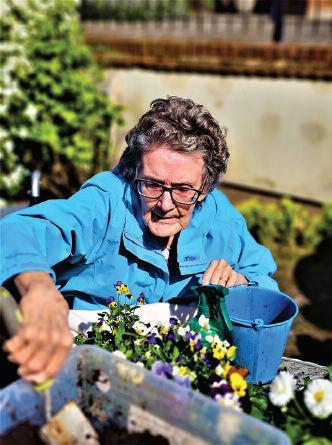

2024, HC-One homes (including Snapethorpe Hall) supported the 2024 Food Waste Action Week (18 – 24 March) There are also ongoing commitments by the care provider to reduce the levels of food waste across all of its care homes HC-One also provides residents (with dietary preferences) a choice of nutritious vegetarian and vegan meals to further reduce the organisation’s environmental impact
Gary Reed Director of Property at HC-One commented:
“I am excited about HC-One’s future as we incorporate more sustainable initiatives across our care homes We are looking to invest in a mix of proven technology alongside innovation across our care homes to help us move towards achieving Net Zero Carbon
Kate Ward Head of Procurement at HC-One said:
“We are committed to the long-term sustainability of our business operations and 2024 will see us roll-out further green initiatives We continue
our

Specialist Neurologic Music Therapy (NMT) is now available as part of a multidisciplinary therapy offering at Queen Elizabeth’s Foundation for Disabled People (QEF) in Surrey One of the expert services the charity provides Care and Neuro Rehabilitation supporting people in rebuilding core skills after an acquired brain injury, stroke, spinal injury or neurological illness
From April, neurologic music therapy will be delivered in partnership with CHROMA, the leading arts therapies provider It will be available alongside physiotherapy psychology speech and language therapy and occupational therapy at the charity’s Care and Rehabilitation Centre
Music connects and activates areas of the human brain creating an automatic response, so a pre-existing love of music is not necessary for NMT to be effective This allows unaffected parts of the brain to be used to re-learn functions such as movement or speech, creating new neural pathways
It is a gentle way to approach and increase engagement with therapy and will be especially useful for those who are struggling to make progress in their day-to-day therapy sessions and those struggling with low mood

Using a series of music-based interventions that are informed by the neuroscience of music and neuro rehabilitation it can help to address functional changes for people with neurological disorders Melody rhythm and beat can all be used to stimulate shape and change the flow of movement speech and cognitive skills Rhythm can be especially effective as it provides a metronome ‘structure which can help to regulate speech patterns and the speed and flow of the process of walking
Jenny de Canha Head of Clinical Services at QEF’s Care and Rehabilitation Centre says; “Neurologic music therapy is a great addition to our therapy provision allowing for alternative rehabilitation practices to be considered for our clients I am excited to be working with CHROMA and look forward to how their expertise may influence client outcomes and goals
Initially available as a 6-month pilot project thanks to funding from The National Lottery Community Fund and The Community Foundation for Surrey The aim is to work with
Milestone plans which will see the delivery of a 75-bedroom, highly sustainable care home in Harpenden Hertfordshire have been approved by councillors
The state-of-the-art development is being brought forward by care home provider Oakland Care It becomes the 11th addition to the business growing portfolio of care homes across the South East and London This reflects their leading reputation for care giving exemplified by their recent rating as one of the UK’s Top 20 Medium Care Home Groups for 2024
Oakland Care are a carbon neutral care home group well recognised as the ‘greener choice’ of care homes in the UK for their pioneering approach to sustainability The new care home is their most innovative and sustainable to date and will be powered by 100% electricity

125 solar panels will be installed to generate power for the care home whilst air source heat pumps will help heat the building via an under-floor heating system The Harpenden care home will be Oakland Care s first home to be powered by renewable energy that does not connect to the gas infrastructure grid
As part of the transformative plans 12 EV charging points will be delivered supporting the ongoing electrification of the transport network Meanwhile, a wildlife garden area is also included in the plans to promote and support biodiversity
Through these efforts Oakland Care are aiming to deliver a carbon neutral, net zero home which is certified Excellent by BREEAM the world s leading sustainability assessment method for buildings and organisations
Alongside these industry-leading green features the new care home will offer residents fully equipped accommodation and amenities such as café bistro, hair salon, activity room, library, quiet lounges, and a multi-function central courtyard
Construction is set to commence in June 2024
Joanne Balmer BEM Chief Executive Officer of Oakland Care said:
“This is a major milestone for Oakland Care and one I am incredibly proud of This achievement is testament to the outstanding efforts of all those we have worked alongside to get the project to this point and I am delighted that we have
be able to expand our portfolio of care homes is also a sign of our continued progress as a care provider We have become well-recognised for the outstanding care we deliver to our residents and look
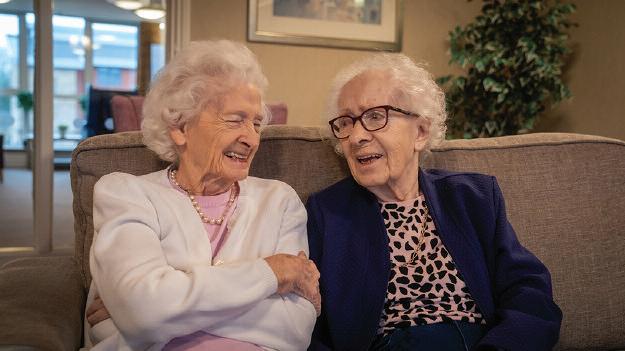
She said: “The reunion was lovely So very heartwarming We have seen them come together and reminisce about their history I don t think any of us at Prestbury House have ever had a situation where friends have reconnected after so many years – to then be back together under the same roof
I supported Anna hugely with her move and this really has sparked a new sense of identity for her Life had taken them in different directions but they have found each other again!”
Darcie added: It s easy for people to feel like they can lose their identity when they move into a care home, so we strive to ensure our residents feel like this is their home and they feel independent We want our residents to hold onto their memories and to keep their history alive
This friendship is so lovely and we have spent lots of time discussing Anna and Mary s past Reuniting people and reigniting those memories is a huge part of what we do – and this story was such a lovely surprise!”

Voyage Care provider of care and support for people with learning and physical disabilities brain injuries autism and complex needs across the UK - has welcomed Leeds West MP, Rachel Reeves, to one of its West Yorkshire residential care homes
Ms Reeves visited Summerfield Court, one of Voyage Care s specialist brain injury rehabilitation services in her local constituency Bramley She met with those living at the home and their support workers to discuss how the support provided enables them to live the life they choose
Voyage Care colleagues spoke with pride about their Headway Approved Provider status and discussed the importance of adequate funding for social care services in Leeds - highlighting how some individuals in local communities can face a postcode lottery accessing the support they need to live happy and healthy lives
Ms Reeves also met with Gary Franklin Service Manager at Summerfield Court who gave a tour of the home and discussed some of the wider issues affecting the sector with the MP

Despite delivering lifechanging outcomes for those supported the adult care sector in the UK continues to face a lack of funding, inequality and ongoing recruitment and retention issues, with a recent Skills for Care report showing that there are currently around 152 000 vacancies nationwide with a turnover rate of 28 3%
To help tackle these issues Voyage Care is campaigning to raise the status of those working in the adult
A retired Carer who worked in a Standish-based home has continued her vocation by making Memory Bears for families of those who have passed
Diane Cann a former House Assistant at Worthington Lake Care Home a dementia specialist home which is part of the Millennium Care Group, left her post in November after more than four years at the home
Worthington Lake Care Home is part of the Millennium Care Group which has five homes across Lancashire and Greater Manchester
Having built close relationships with the home s residents and families she has continued to support them after the loss of a loved one
A Memory Bear is a special teddy made from the clothing of a loved one who has passed away They can provide comfort and be made from a multitude of items
Diane has made three bears in total most recently making one for the family of Norma Richardson a resident she had a great relationship with who sadly passed in January:
social care system to ensure there is parity of esteem with peers in the NHS In addition to the creation of a national register of social care workers, Voyage Care is also calling for a more consistent social care commissioning model across all local authorities to ensure that the individual needs of those requiring support are met in all cases, regardless of who is funding their care and where they live Shaun Parker, CFO at Voyage Care, said: “We were very proud to welcome Ms Reeves to Summerfield Court and I know that all the team and those we support appreciated the opportunity to share their stories and discuss wider adult social care sector issues with her The people we support are at the centre of everything we do which is why it is essential that the sector has the necessary support to ensure people are empowered to live their lives to the fullest
“By discussing the key issues facing adult social care in the UK we hope to drive positive change and ensure high quality support is accessible to all who need it ”
Rachel Reeves Leeds West MP said: “It was a pleasure to visit Summerfield Court to see the excellent work that is taking place to enable individuals to have independence and autonomy over their lives
We know that the adult social care sector is currently facing a number of challenges and by working together with organisations such as Voyage Care, we can try to tackle these and ensure everyone gets the support they need regardless of their circumstances
Diane said I do a bit of sowing but I have never made anything like this before A couple of the girls asked me at home so I thought why not? “The family’s responses have been great they ve been overwhelmed I don t do it for praise, I do it for them I try and personalise the bears Norma loved wearing jewellery so has a pearl necklace
“Right from Norma coming in we just clicked She was an emotional lady and she loved telling me about the cruises she’d been on I have a lot of experience with dementia you get to know people and how they re feeling and it was great getting to know her
Trudy Murray Norma s daughter said

I was really made up it was lovely She chose all the jumpers that my mum wore her favourite ones and even personalised it with some little pearls I was really pleased The bears just sitting on my bed at the moment it s so special
“My mum was at Worthington for about two and half years, she really liked Dianne who really looked after her when she moved in There s even a photo of them sitting on a bench together my mum loved her!
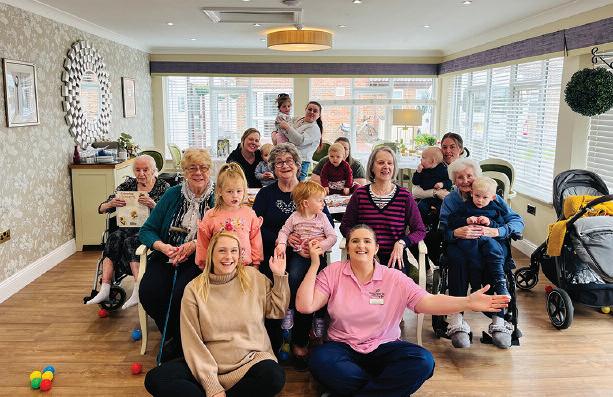
and keep us and their Mums on their toes!”
General Manager Paula Colman of Hickathrift House Care Home said: “We were thrilled to relaunch the Toddler Mornings to support the local community our staff with children and the residents at our home We always love our young visitors This
Our varied life enrichment programme keeps residents active and provides a daily choice of engaging physical mental and spiritual activities tailored to residents’ interests and abilities
Hickathrift House Care Home is run by Barchester Healthcare one of the UK’s largest care providers, which is committed to delivering personalised care across its care homes and
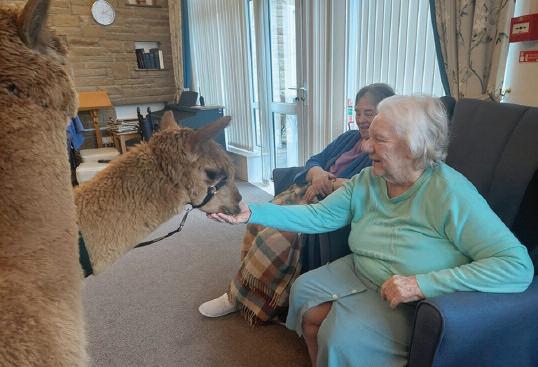
Thanks to the wonderful generosity of its supporters charity Friends of the Elderly, has raised a staggering £18 084 through its Winter Appeal –every penny of which goes towards providing grants to help older people who are living in financial hardship
The cold and isolating winter months have been challenging for many older people but thanks to the kindness of all those who donated we have been able to help many older people who were struggling It’s wonderful to hear that since receiving help 81% of our grant recipients told us they feel less stressed and anxious,” said Miriam Willmott, Friends of the Elderly s Senior Grants Officer
One grant recipient was 73-year-old Melissa* who lives alone and was struggling with two windows in her house that were causing a bitterly cold draught “My windows were starting to deteriorate and were rotting the condensation constantly forming on these single glazed windows was creating damp throughout the frames and resulting in black mould said Melissa

Melissa was not just worried about her rising heating costs but she was also very concerned about the effect of the damp and cold on her health and wellbeing “I was concerned about draughts, owing to lung challenges since a lung operation I had last year Melissa continued Friends of the Elderly provided a grant of £400 to help Melissa pay for two new windows in her home

which are sturdy and double glazed The grant has made me feel relaxed and secure in my home I am no longer worried about when the windows are going to fall out completely – the windows I have now are strong and they will see out the rest of my life,” added Melissa
Helping older people like Melissa is the



Coventry City may not have won their Semifinal clash with Manchester United on Sunday, but they did win the hearts of many, including staff and residents at a Coventry home
Former Sky Blues defender and current head of community David Busst and his colleagues from Sky Blues in the Community visited MHA Charnwood House
The home provides residential dementia care for 65 residents
The visit took place prior to their semifinal clash which residents watched together in one of the lounges at the home with their Coventry City football shirts scarves and flags
David was accompanied by John Szyndler Mental Health and Well-being Manager and his PAT dog Winnie
The residents had a wonderful time mingling with the former premier league defender but it was Winnie who got first prize for popularity on the day
Ellen Bishop activity coordinator said: “ Most of the residents here are Coventry City fans so when we told them what was happening
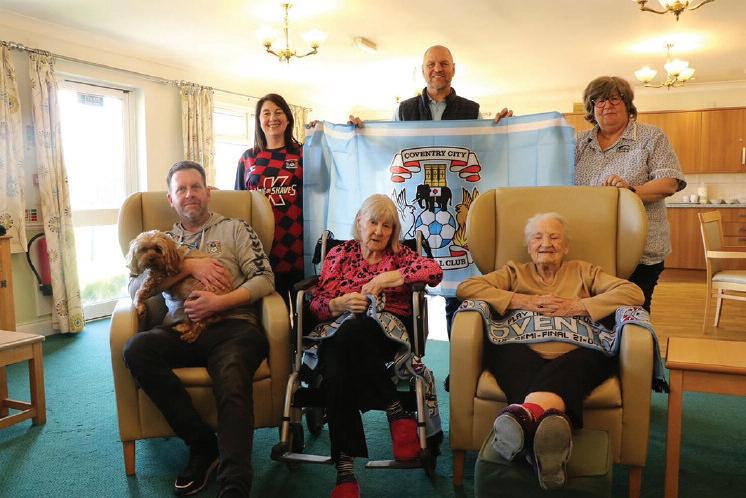
they were really excited
“Not long after I joined the home, I arranged a residents meeting where we spoke about how we can engage the residents family members into the activities we do and make them community focused
“One of the resident’s family members knew John and that’s how the connection was made
The visit went really well David and his team interacted with residents and spoke about his time as a player amongst other things
Winne was an absolute star really well behaved and the residents really enjoyed the day
We all watched the semi final together and even though the result didn t go our way, it was a splendid game
David Busst shared the sentiment adding: Football has the power to bring people together and we saw that today
It was great to see all the residents and have a chat about football and listen to some of their own stories and interests
Multi-talented Georgina ‘Jean’ Pendregaust finally gets to celebrate her 100th and 104th birthdays at the same time!
Sadly the lockdown caused by the pandemic meant her 100th birthday four years ago had to be celebrated through social distancing And her 104th birthday party at the start of April had to be postponed due to illness at the care home she has lived at for the past five years
Thankfully now she is gearing up for a double party soon! And Mayor of North East Lincolnshire Councillor Steve Beasant will be attending to help her celebrate Georgina, or Queen Jean as she is affectionately known by her care home friends has led a full and colourful life in and around Grimsby and is showing no sign of slowing down
Queen Jean is one of seven children and with husband Jim had two children Stephen and Jennifer She now has three granddaughters two great-grandsons and one great-granddaughter
In the year of her birth (1920) the Treaty of Versailles was signed which effectively ended World War I women gained the right to vote in the USA and experiments in radio broadcasting were made from the Marconi factory in Essex
Queen Jean has lived through 26 UK Prime Ministers, 19 US Presidents, nine Popes and five British Monarchs Also born in 1920 were Pope John Paul II, actor Mickey Rooney and author Ray Bradbury
In the entertainment scene Mary Pickford and Douglas Fairbanks were married in 1920 effectively becoming the first Hollywood power couple
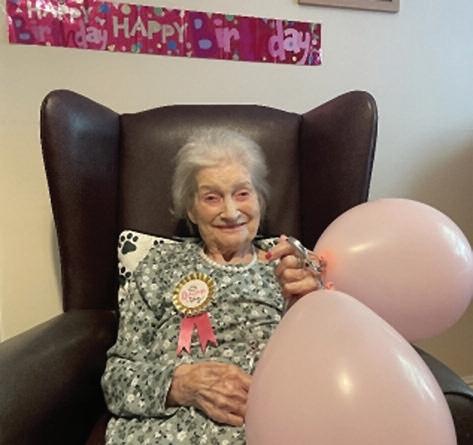

A 21-year-old care worker from Taunton has been awarded her home’s first ‘Recognition Award’ for being an outstanding member of the team at The Rectory
A recent graduate of the University of London where she gained a BSc in clinical psychology with Royal Holloway Wiki started working full-time at The Rectory last May having worked there part-time over the previous three years while studying for her degree
Abbie Foster manager at The Rectory said: Wiki is an amazing team player highly motivated loved by everyone and most importantly she s just wonderful with our residents
Our new Recognition award which will be presented monthly is designed to acknowledge outstanding effort and Wiki is a worthy first winner
“She gets on with everyone the residents love her and she has a really positive relationship with all her co-workers
Wiki understands what it takes to be an excellent carer and she can always be relied
on to get any job done to the highest standard
“She has all the qualities it takes to make a real success of a career in care and we’re so glad to have her working with us
Wiki is looking to further her career in psychology by applying for masters psychology apprenticeship which will lead to further education into a doctorate in psychology
Wiki said: I originally heard about the job at The Rectory through a friend and as soon as I met Abbie other members of the team and some of the lovely residents I knew it was somewhere I’d enjoy making a positive contribution
Working full-time here I m learning so much and the experience is totally reinforcing my desire to follow a career in the care sector
“I love knowing that what I do during my working day helps our residents to feel looked after keeps them safe and comfortable and ensures they have a really good quality of life – which is exactly what they all deserve!
Care home carer and gardener Rob Wilcox is planning to jump out of a plane in a tandem skydive to raise money for charity in memory of his father
Rob, who is part of the team at Alex Wood House care home in Cambridge has always found joy in his work His days are filled with nurturing the residents and tending to the gardens at the Arbury home
Despite his busy schedule, Rob has always harboured a secret wish – to experience the thrill of a skydive For his birthday his wife made that dream a reality by booking him a skydiving adventure Rob s said his anticipation and excitement is building as the date May 18th approaches
He's not just looking forward to the adrenaline rush of freefalling from the sky but also to the opportunity to









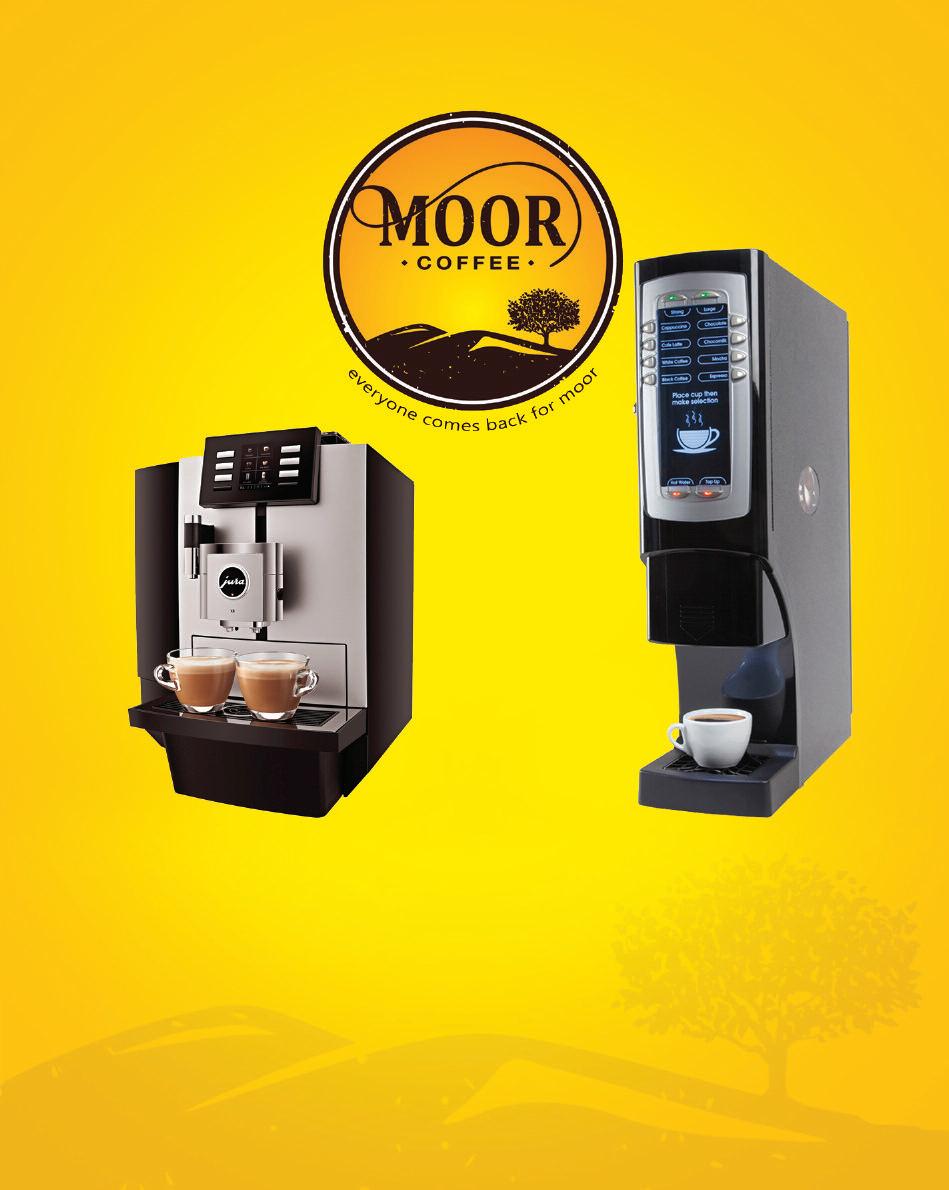
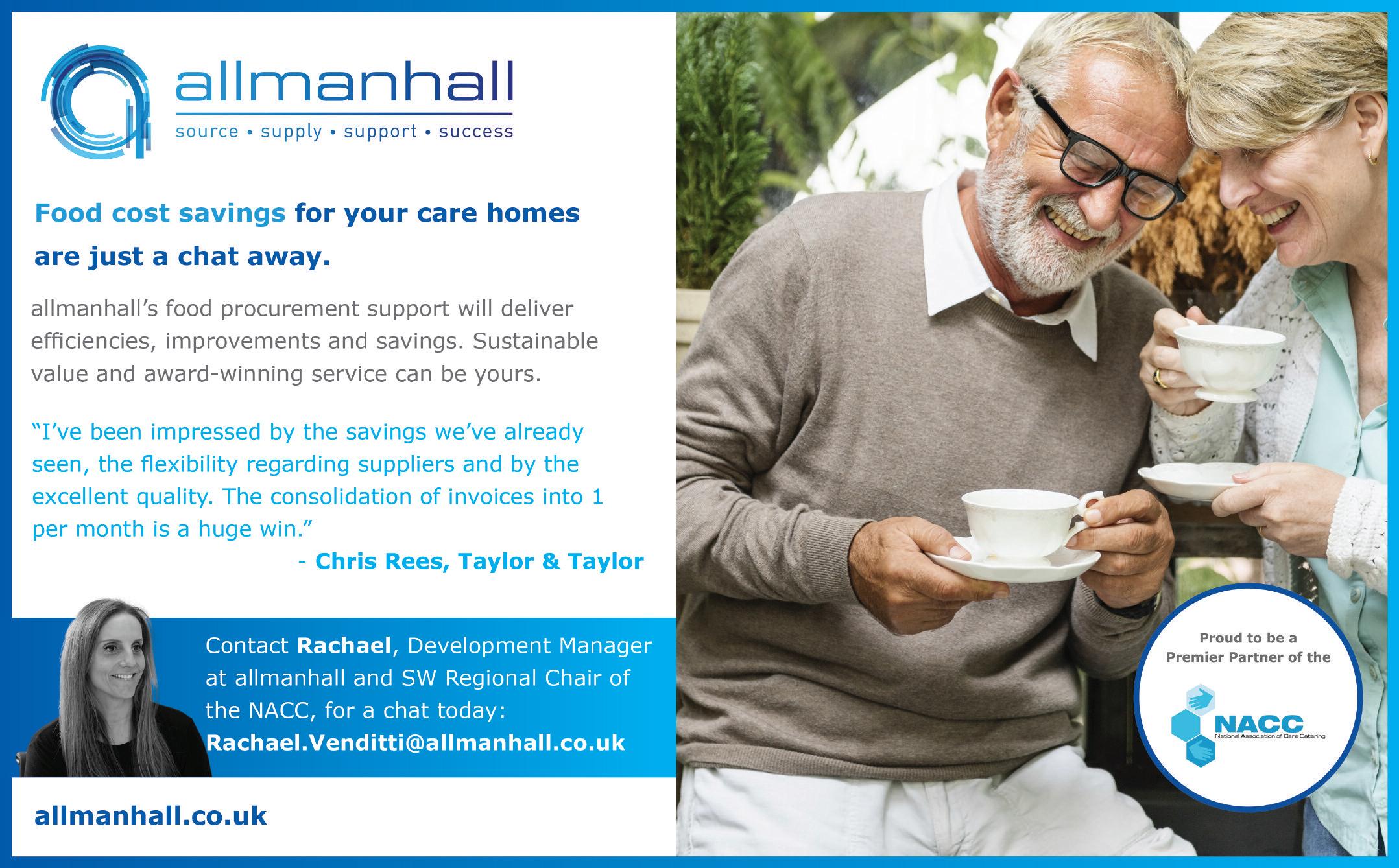

free from the usual worries associated with heating maintenance and repair Website www swiftresponseltd co uk Phone number 0800 577 0026 Email swiftresponseltd@gmail com See page 11




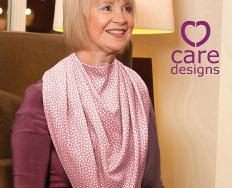

MOWOOT II - a revolutionary non-invasive solution to chronic constipation
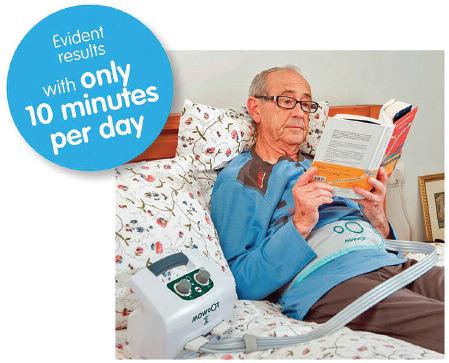


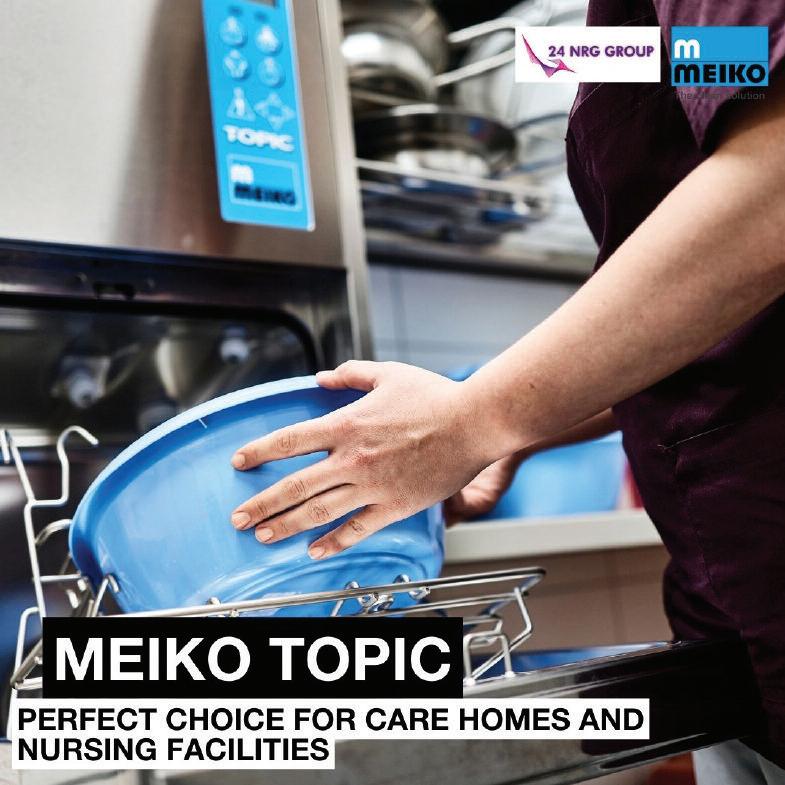



•

machine life saving money
preventative maintenance Proper servicing extends
Reduce energy bills by preventing limescale build-up in machines – 1 mm of limescale can increase energy usage by 11%
Angloplas are

healthcare providers and who are employing a combination of infection prevention and control strategies including hand hygiene cleaning training and the adoption of new technologies to tackle the problem As a result a wide range of infection control products and technologies are emerging on the market including antimicrobial technology Angloplas range
are produced in the world s first proven Antimicrobial PVC with silver ion technology and which is exclusive to Angloplas This helps reduce the risk of cross infection by stopping the growth of bacteria and mould and works continuously for the lifetime of the product, reducing levels of bacteria such as MRSA, E Coli Legionella, Salmonella and mould by up to 99 99% For non-clinical environments
Angloplas has recently launched its new Budget Range of products which are made to the same exacting standards as the antimicrobial protected ones but with lower price tags
You can order Angloplas products directly from its website by going to www angloplas co uk




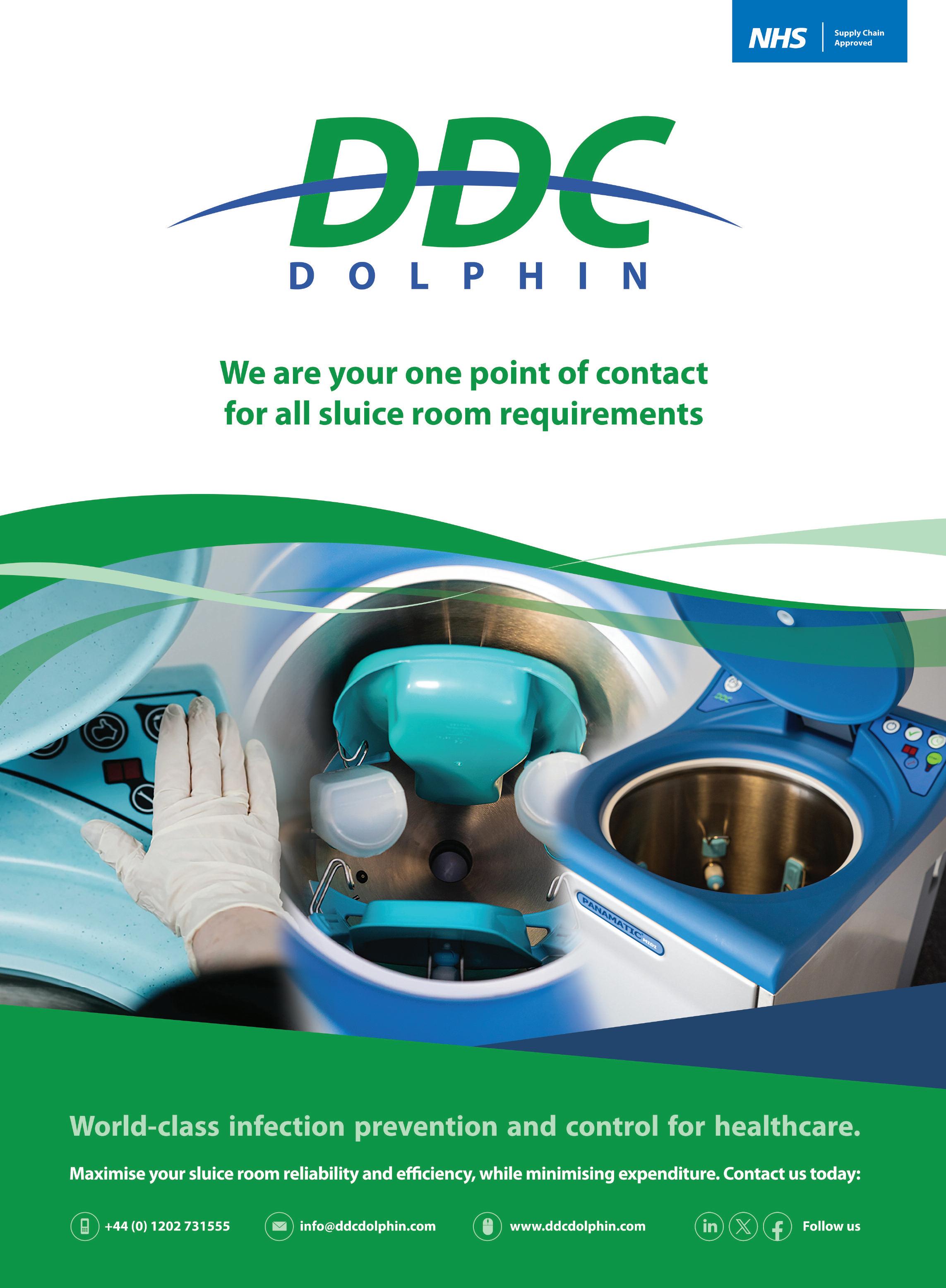






ories which are inspired by real experiences and are full of vibrant colours
Also a couple of our residents really enjoy tackling more challenging jigsaws I’m so impressed with how brilliantly they complete them; I certainly couldn t do as well as they do added Chelsey
“Puzzles are a very good pastime for our residents as they can improve mental speed and thought processes – and they are also a positive activity for improving short-term memory They can, of course be an individual activity but they are also a great group activity which creates opportunities for engaging with others chatting and conversations and making friends Daniel continued
Other benefits of puzzles include helping relaxation as by immersing yourself in a puzzle it can serve as an exercise in mindfulness and help to relieve stress For the elderly in particular the act of picking up puzzle pieces turning them over and fitting them together can sometimes but quite a challenge However puzzles are a great way to exercise the small muscles in fingers and eyes

“One of our residents told me that jigsaws can be traced back to the 18th Century when European map makers put their maps on to wood and cut them into small pieces They did this to create learning tools to teach geography – so really interactive puzzles have been around for quite a few hundred years Daniel continued I really do learn something new from our residents every day
“Our interactive Tiny Tablet is another example of our commitment to provide exceptional standards of quality care through person-centred care as all our residents can join in and take part in the group activities or use it on their own It’s up to them – they can do what they want to do when they want to do it ” Chelsey concluded
For more information on the Tiny Tablet see the advert on the facing page
Recreo VR headsets help improve the mental and social wellbeing of those you support with person-centered VR experiences Our fully managed service is a fun and exciting way to personalise care enhance activities and improve the quality of life of your residents
Our service has been designed for the care sector with an intuitive app which does not use controllers or difficult operating systems Our library of incredible experiences means there will be something for everyone! The headsets even work offline which is brilliant for domiciliary care and for those rooms where wifi doesn t reach VR is an impactful activity and can be really effective during one-to-ones in
group sessions alongside themed activities, and in reminiscence sessions for people living with dementia Our headsets and experiences have been co-designed with people living with dementia and Alzheimer s Society and have been shown to improve wellbeing and help recall memories
All headsets come with our full support and training to help integrate VR into your everyday care plans and activities
For more information or to schedule a demonstration, contact us at info@recreovr co uk or give us a call at 01482 526940 Visit our website at www recreovr co uk to discover the possibilities that Recreo VR can unlock for your care facility


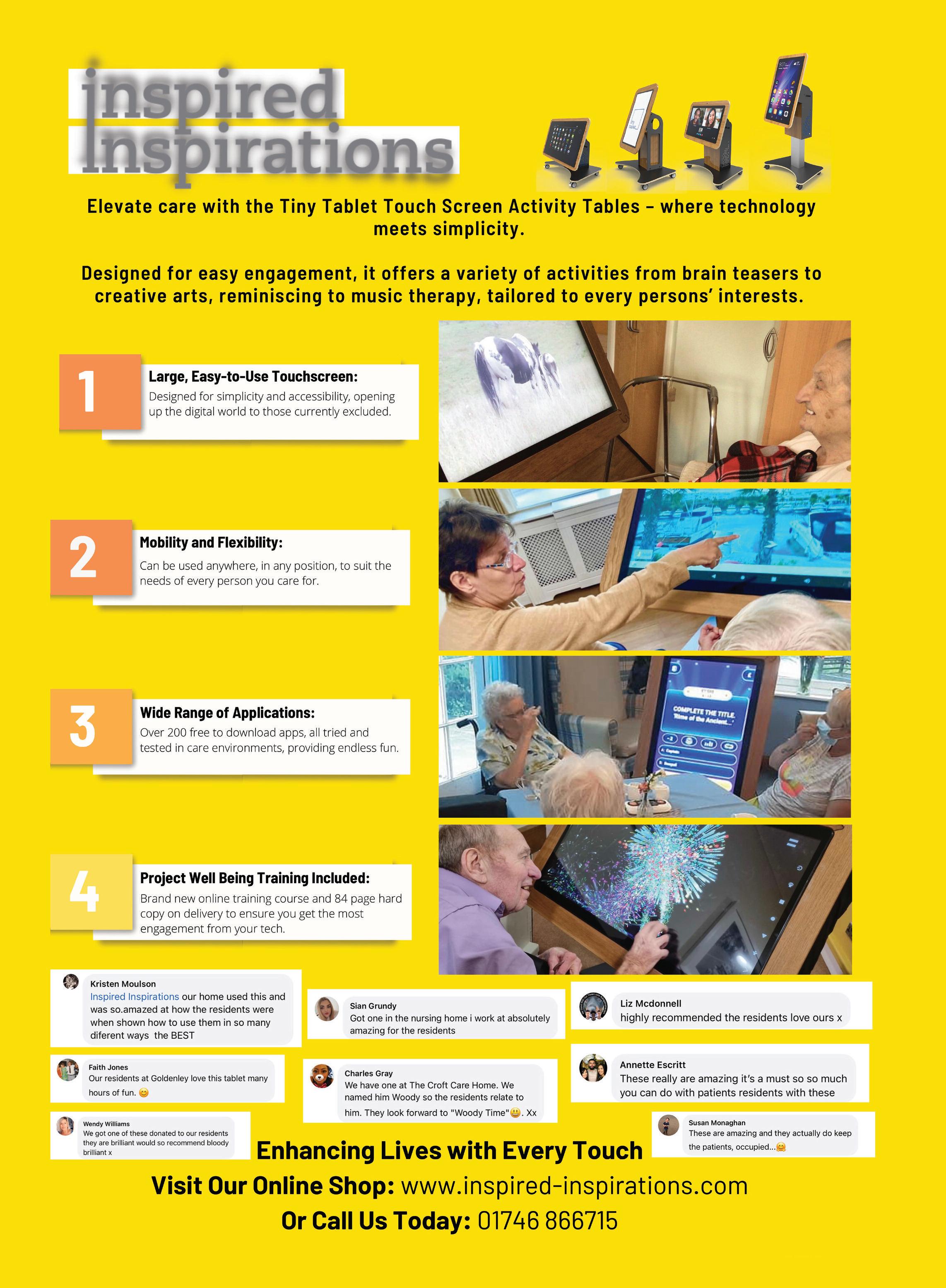

By 2030 one in six people in the world will be aged over 60 (including me!) The WHO now outlines loneliness as a key risk factor for the wellbeing of people in later life As a potential solution we’re increasingly seeing AI companions championed for being virtual friends who will listen and talk to individuals With loneliness and feelings of isolation rife amongst the elderly and vulnerable it begs the question: could AI chatbots be beneficial in care?
In short we would argue no Here s why
INTERPERSONAL RELATIONSHIPS ARE KEY
Complex issues such as loneliness cannot be solved by technology alone AI chatbots may seem like a promising solution but they cannot replace the human element of companionship and care that is so essential especially for those who are vulnerable and have complex needs
Carers play a vital role in providing not only basic physical care but also emotional support and understanding This is especially important for individuals with disabilities who may feel isolated due to their condition or those with cognitive challenges and degenerative conditions such as Dementia
Chatbots are not suitable for everyone And in such cases human empathy is necessary to interpret the needs and communicate effectively with the patient
Empower carers and patients through technologies
The use of technologies such as AI in care must be evaluated to ensure it complements and enhances human connection rather than replacing it This means there must be careful consideration when proposing how to fit technology into the roles of those who may be the people patients see and talk to most as well as how it can be used to make the care journey better for patients
Although chatbots cannot replace human carers a combined approach of AI and other technologies can help care providers and facilitators
For example currently a typical caring schedule often includes three in-person visits per day for each patient However, due to time constraints, caregivers may have to rush these visits In this case, we would argue, that
technology can be used to allow carers to perform a more thorough in-person visit and follow up with two video check-ins based on the patient's needs (these video care calls can even of course be instigated from overseas)
Remote intelligent monitoring and predictive analytics can also be used by carers to capture an accurate overall picture of a patient s well-being to design better care programmes in advance rather than spending too much time during an in-person appointment on data capture
As well as improving patient-centricity, AI has the potential to streamline services for care facilitators by taking on mundane tasks and freeing up the caregiver's time and talent for creativity and innovation For example the administrative work involved in the daily operation of care providers and facilitators AI can handle emails user inquiries and information requests enabling users to access information quickly so management can focus on solving more complex issues efficiently
Ultimately the current care system is dealing with legacy and complex technology which has held back much-needed innovation While AI can be a potential solution many care providers see AI as a cost-cutting solution without first addressing the underlying issue of an inadequate care model
Digital transformation within the care sector should instead prioritise the needs of patients and carers rather than simply implementing technology for the sake of it Technology should add value to the care journey for example making it safer by vetting carers ID and training documents with banking-standard technology or reducing the time carers spend doing admin so they can focus on their vocation Similarly it should enable patients to access care easily and quickly so that they aren t stuck in the hospital and have better care outcomes
The successful implementation of AI in the care sector requires careful consideration of how it can meet the needs of patients And for that reason it’s not an effective way of combatting the loneliness of people in care AI cannot replace the crucial interpersonal relationships between carers and patients that build trust safety and companionship However it can help ensure carers have more time to put the needs of patients at the heart of their work The key to successful AI implementation in the care sector is putting the patient first
Care UK s luxurious new Oat Hill Mews care home in Leicestershire gets the latest in Smart TV and digital signage technology from Boltonbased TVC Technology Solutions in time for its recent opening Oat Hill Mews is a stunning new development by Care UK offering the best in assisted living on-site care health and wellbeing for residents
Designed as a showcase of Care UK s portfolio the Market Harborough venue boasts luxury accommodation an on-site hair and beauty salon a dedicated café an on-site cinema multiple lounges and a fully equipped bar
To complete this high-tech luxury venue Care UK asked long-term audio visual and domestic appliance supplier partner TVC Technology Solutions to furnish the luxurious bedrooms resident common areas and cafes with the latest in Smart TV technology Maintaining the cutting-

edge theme Care UK wanted the latest in digital signage throughout the main areas enabling them to show various guest information restaurant menus and entertainment schedules
With Oat Hill Mews officially opening at the start of 2024 the complete AV and digital signage systems were specified installed and tested well in advance Early visitors have already been impressed by the neat hightech and luxurious feel of Oat Hill Mews from the reception area with its HD digital signage to every bedroom featuring a 43in Smart TV on either articulating or swivel wall brackets to provide the best viewing experience to its residents
Heading up the TV-technology TVC specified its own-brand Mitchell & Brown Smart TVs in 43in screen size for every room These fully featured Freeview Play catch-up TVs with all of the apps for streaming services such as Netflix Amazon Prime Disney+ and Apple TV offer Full HD picture quality and are backed by Mitchell & Brown’s UK-based

foodservice solution to help make any dining experience exceptional Fairfax Manor in Harrogate acquired from Angela Swift Developments in 2023 and will shortly be open to new residents The home has been thoughtfully designed to offer an exceptional living environment with a range of outstanding facilities The newly recruited team are in place ready to warmly
ai

In the post pandemic world we have all seen the effects of supply chain problems with the invasion of Ukraine and other alarming global factors ever increasing costs of living and other more local issues which have driven up the rate of inflation over the last few years The impact of this meant that most manufacturers of electronic products had to increase their prices as costs spiralled This, of course, has impacted the end user The most dramatic impact has been on the Care Industry An industry that has lacked the support it desperately needs in these trying times
Courtney Thorne at the same time took a strategic decision to take a close look at our core products right down to component level the objective being to make us less vulnerable to future global supply chain issues and to reduce the cost of each product with the amin of ensuring that we deliver the same high quality product at a cost protected price We had to ensure that this would happen without jeopardising the superb levels of support we pro-
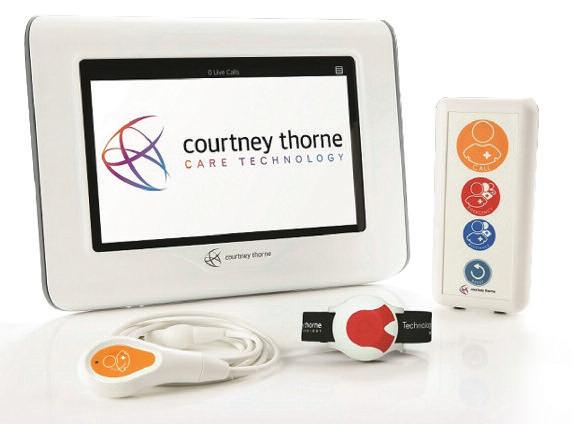



or wandering An optional anti-slip mesh reduces the potential for slippage on hard surface floors FEATURES INCLUDE: Connects directly to most nurse call systems High Quality anti-bacterial Floor Sensor Pad Large Size Pad: Measures (L) 91cm x (H) 61cm




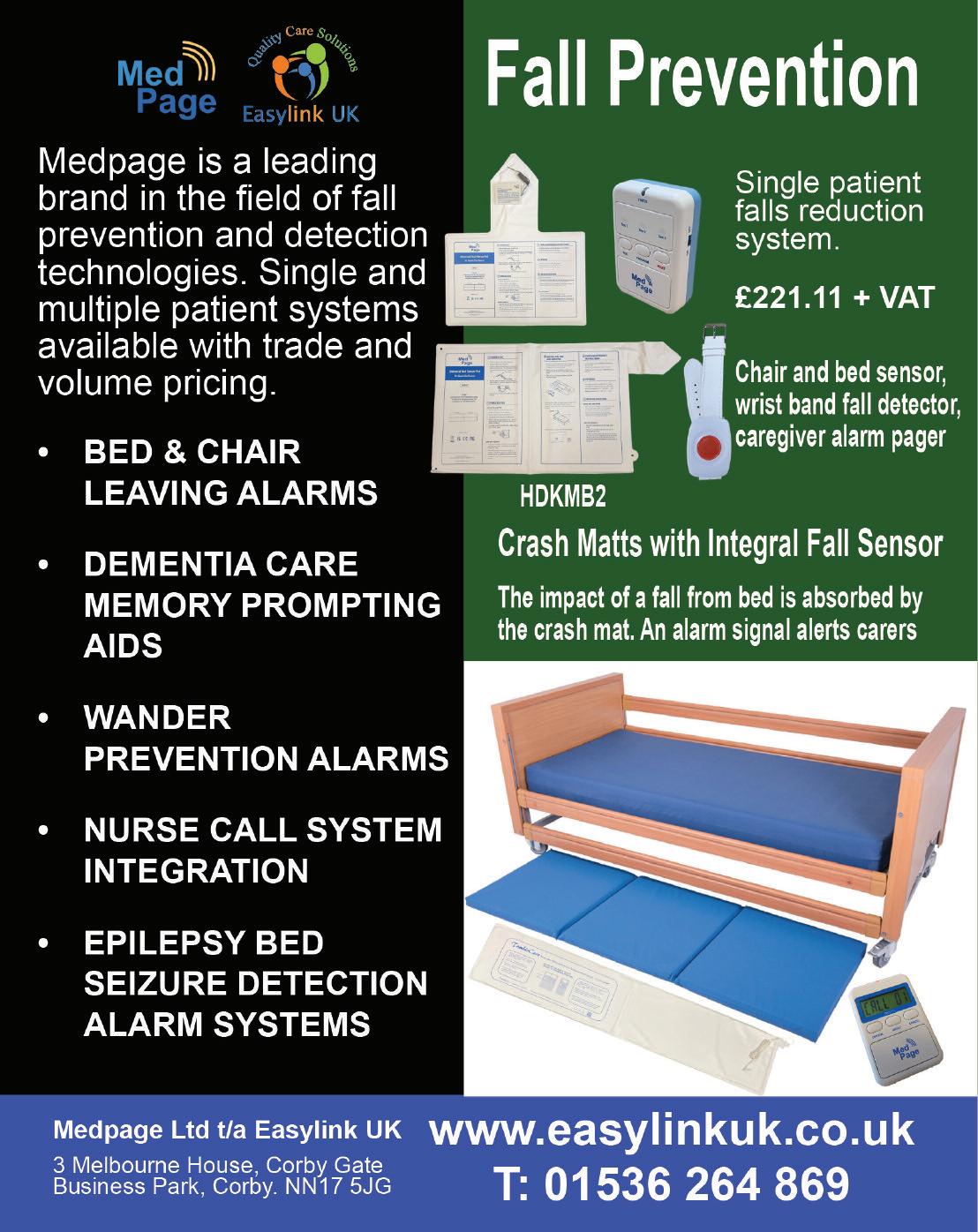
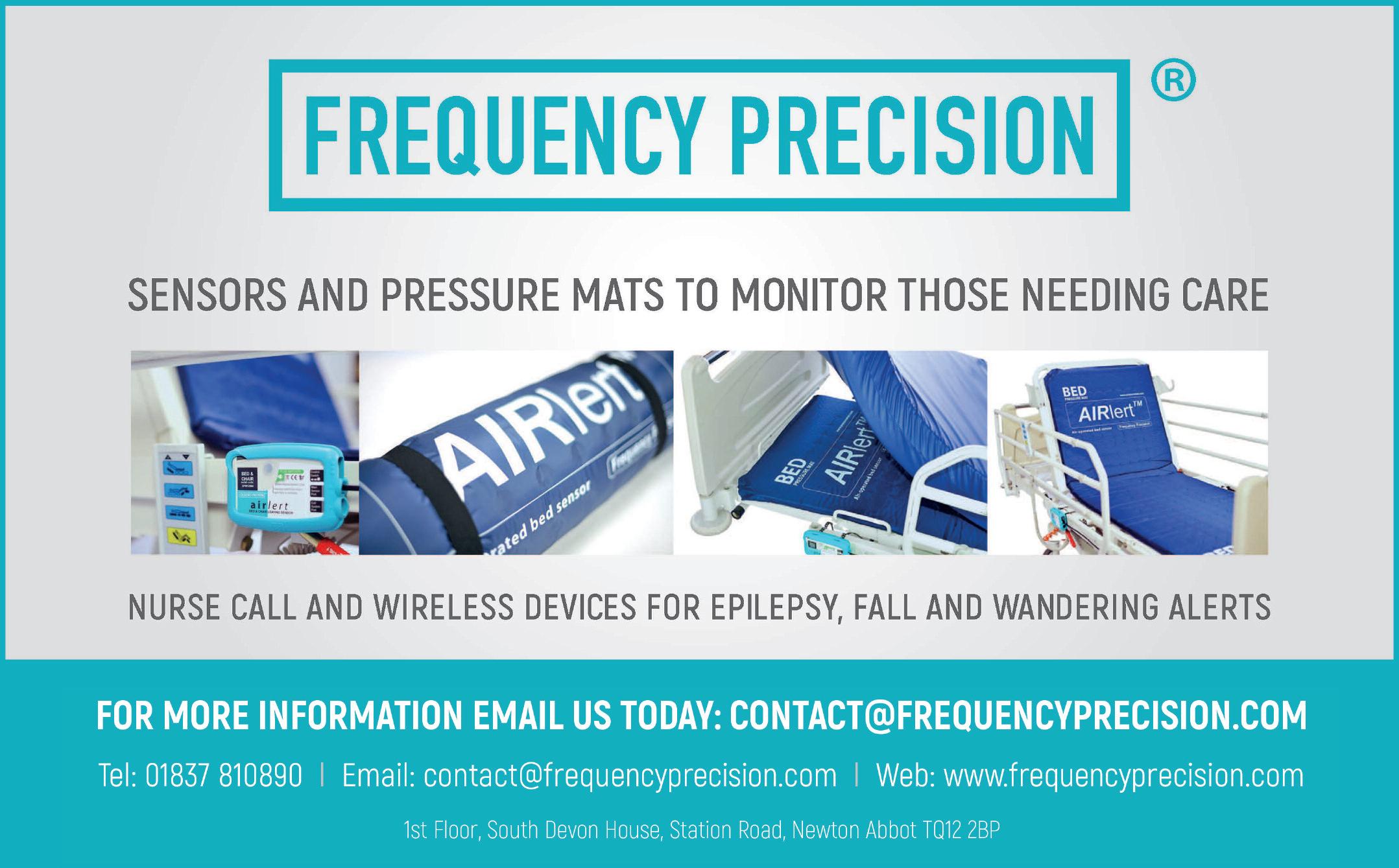
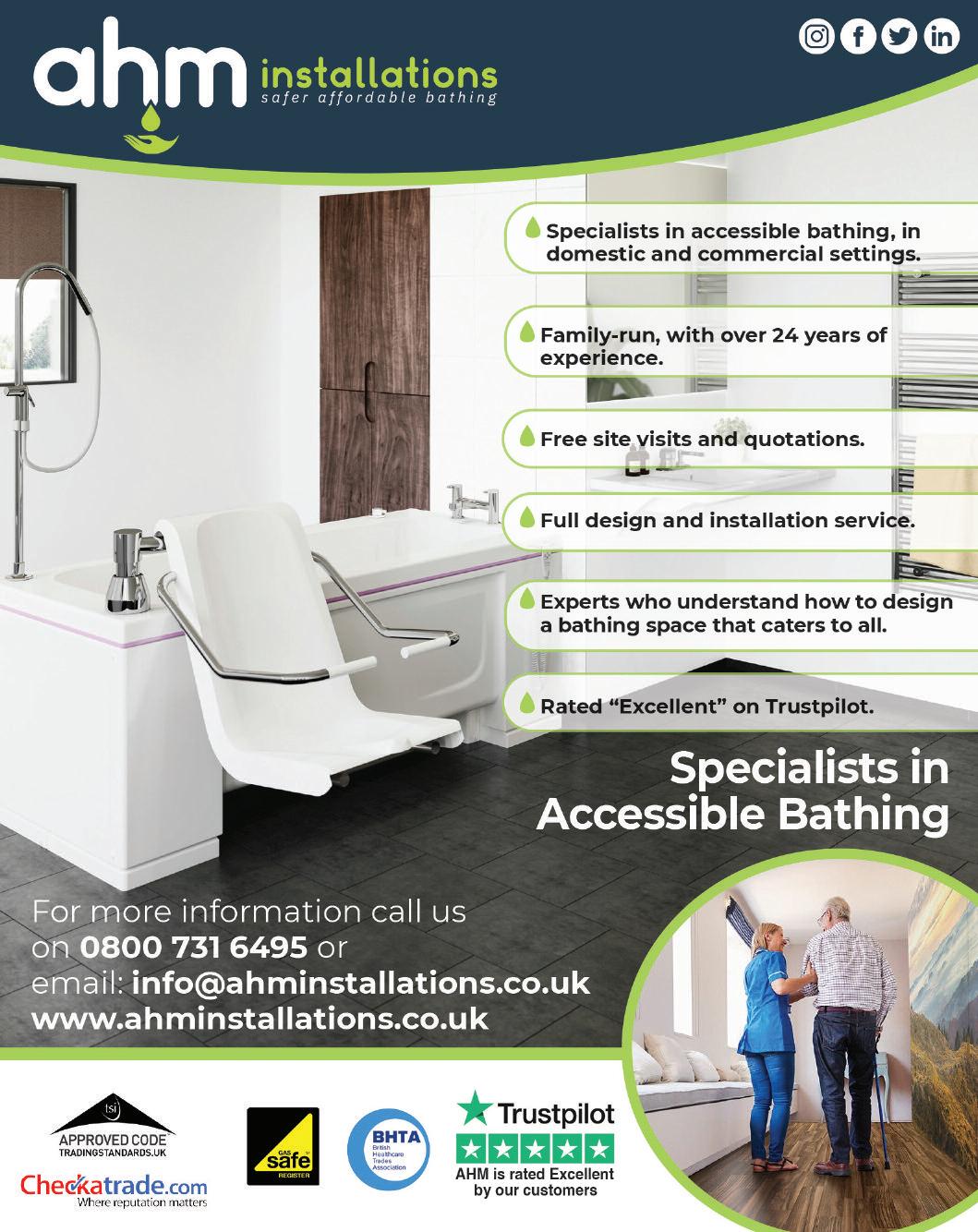
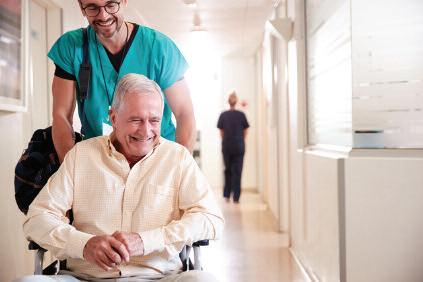
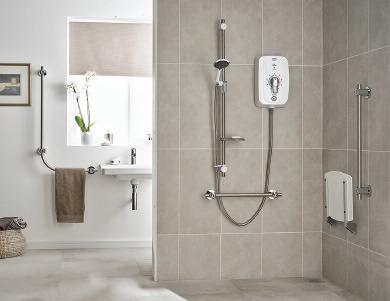

For over two decades Advanced has supported care organisations with innovative software which makes a vital contribution to managing workflows managing costs and achieving regulatory compliance
OUR SUITE OF SOLUTIONS
We provide a suite of software solutions for care organisations in residential domiciliary and supported living settings including:
Care Business Management: A comprehensive toolkit that equips you to manage your care business anytime anywhere ensuring smooth and efficient operations
Financial Management: Streamline your financial processes with tools designed to simplify the complexities of care finances making it straightforward and stress-free
People Management: From recruitment to retaining valuable staff our solutions make managing your team not just easier but more effective

• Governance and Risk Management Stay ahead of the curve with our integrated software ensuring compliance in your operations and effective risk management
• Workforce Management: Maximise your team s potential through intelligent rota and shift planning ensuring the right people are in the right places at the right times





It records not just the de-escalation techniques used, but also their effectiveness This data is exported to a welldesigned behaviour plan, or ‘Smart Plan Our customers have experienced significant reductions in behaviour incidents, with some reporting over an 80% reduction after using Behaviour Smart for just one year Dean Cotton, Director, Behaviour Smart info@behavioursmart co uk www behavioursmart co uk PASS supports
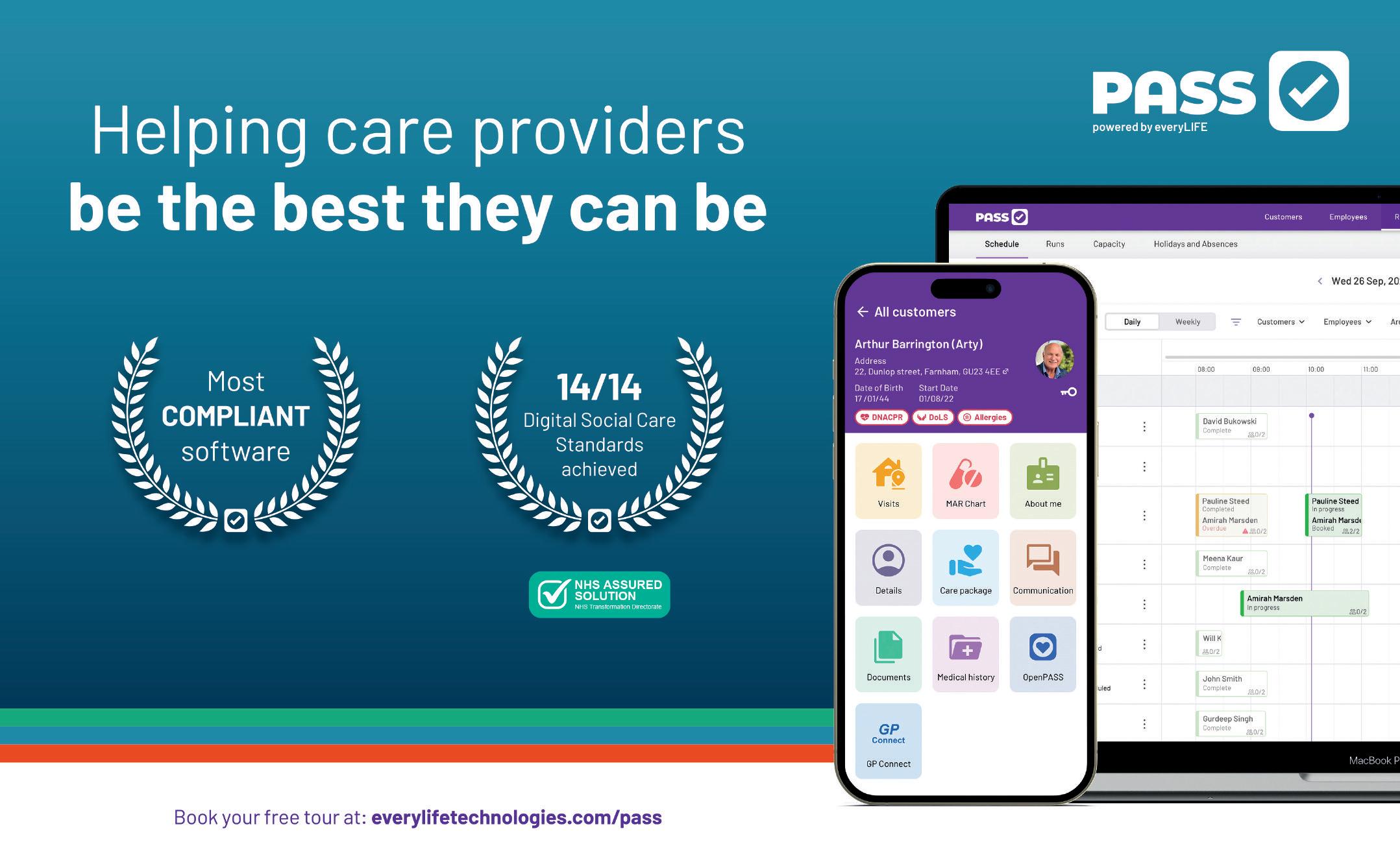

Like it or not, financial accounting is crucial to the operations of your care home Without accurate reports, you cannot make proper forecasts, build accurate budgets, get paid on time by multiple funders and keep bed occupancy at optimal levels
Unfortunately, many care homes don’t have the time or budget to invest in powerful, care home accounting software This results in a vicious cycle where financial teams are so busy running manual tasks that they cannot take the time to improve their accounting systems, only to find each year they are farther and farther behind the technology their care home will need in order to thrive in the long term
Cloud Doing
a licensed partner of Oracle NetSuite, is here to stop that vicious cycle We believe care homes should have access to enterprise-level software without ballooning their budgets, so we donate the base software with up to three users to qualifying non-profit care homes
You know better than anyone that care home management is complex, and we know better than anyone that care home accounting gets complicated fast Balancing income for each resident from Councils, private sources, and family members requires detailed billing practices Add on top of that multiple legal entities, multiple care homes, the need for timely occupancy tracking and your finance team quickly becomes bogged down in repetitive, manual, and frustrating work
To make it worse, most accounting software are designed for slick enterprises (and priced for slick enterprise budgets) That leaves too many care home finance teams battling spreadsheets and duplicate reports to accomplish basic care home accounting tasks
Cloud Doing Good partners with care homes to
implement Oracle NetSuite’s enterprise-grade accounting software at as low a price as possible Here’s how Cloud Doing Good simplifies your care home’s accounting:
Pull all your financial data into a single platform Even with multiple legal entities, multiple care homes, complex billing structures, bed occupancy tracking, resident admissions and departures and additional unique needs, our system aggregates all the pieces of information into a single repository
Whether you need to get an overview of last year’s spending or forecast income, you can run the necessary reports in a matter of clicks This makes it simpler for your team to build forecasts, track spending, track bed occupancy and the financial implications in real time, and manage billing and collecting resident payments easily
When it comes to your financial systems, you need financial experts not call centre IT to set you up for success After all, with cloud software the IT should be pre-built and proven With pre-built base software, we

match our experienced system accountants with your project to make sure it reflects your accounts, your finances, and your people So you get not just powerful accounting software, but confident end users within as little as 15 chargeable days From the start of the project through your first month’s ends, you will have a team of system accountants on call to walk you through doing the day job on the new system
Cloud Doing Good’s mission is to bring streamlined accounting management to organisations that deserve it, so we keep it simple For qualifying non-profit care homes, we donate the base Oracle NetSuite software, including up to 3 users and unlimited UK entities This way, you can upgrade to enterprise-level accounting management without ballooning your budget

When you partner with Cloud Doing Good, you get access Oracle NetSuite’s award-winning accounting management software 25+ years of investment and trusted by over 1 million users, Oracle NetSuite safeguards your data in a cloud network with the latest security protocols and automatic updates to protect against breaches We’ll also integrate the platform into your existing data security structure for smooth, uninterrupted, and safe operations as needed This way, you can focus on your care and let us worry about cybersecurity Don’t risk your data and care home on a solution running small numbers of customers: Oracle NetSuite is powering 38,000+ organisations
We stand ready to simplify your care home’s accounting. Reach out to discuss your needs:
Iain Goldmann, Director
iain@cloudoingood.com
Mobile: 447404354865
LinkedIN:
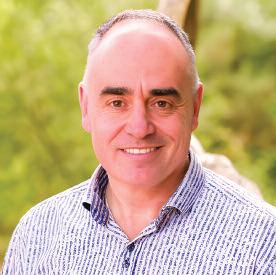
www linkedin com/in/iaingoldmann/


trust and transparency in the UK care sector through patient verified reviews when choosing carers
The partnership will address the critical need to improve patient experiences where only 14% of households are satisfied with care services
Providing more choice confidence and quality of care for patients and their families is therefore essential – and that s exactly the goal of the Curam and Doctify partnership
Doctify gives patients quick access to genuine independent and verified reviews of carers to find the best carer to suit their needs for at-home care These are anonymised based on the experiences of other patients and cover aspects such as the quality of specialists their services and treatments
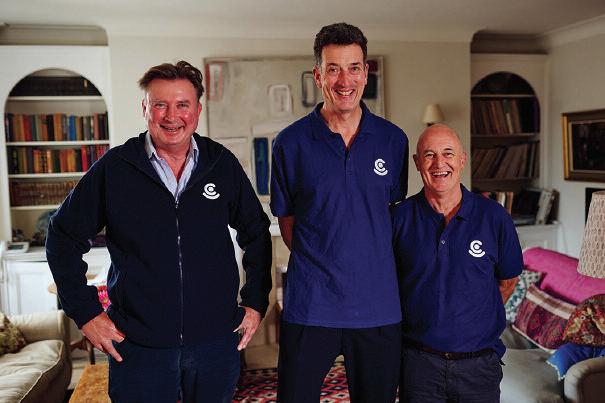
Patients can then click through to Curam to connect with the carers with the expertise and availability that they need in real time Not only does this ensure that patients have complete control over their carer selection and the opportunity to form consistent trusting relationships but Curam’s
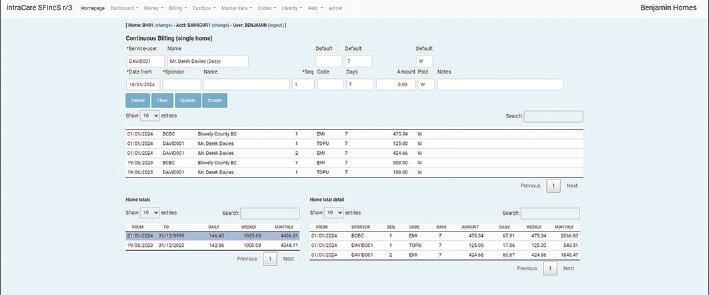

one outstanding application package

A new accredited qualification for care workers will help to improve perceptions of the sector and will boost retention
That s the opinion of a Lesley O Connor Head of Strategic Development at Realise a leading training provider which offers numerous qualifications in the sector
Lesley welcomed the Government s £75m investment to help people progress in their Heath & Social Care careers
The Government recently set out plans for a new accredited qualification and a national career structure for the adult social care workforce
It says the qualification will benefit around 37 000 workers within the sector while the defined career pathway will help people plan their future progression
But Lesley said while the funding package would make adult social care a more attractive proposition, it would likely only make a small differ-
ence to the 152 000 vacancies within the sector
This Government investment to add accreditation to the Level 2 Adult Social Care Certificate is very welcome and it will give the qualification additional value said Lesley
A clearly defined career pathway is also something I have championed for a long time and it offers people a clear route to progress their careers
It will also help to improve perceptions of adult social care as a whole
People still think of adult social care as looking after old people and everything that goes with that but the opportunities are far more varied including helping young people with disabilities and assisting with treatment and recovery from addiction
“I hope it will encourage school leavers to consider adult social care as a viable skilled career with progression opportunities rather than a stopgap It will undoubtedly help to raise the profile of the sector and will give people with limited qualifications the chance to build their skills
“It’s well-known that people stay longer at places where training is available ”
People in adult social care jobs will be able to enrol on the new Level 2
Adult Social Care Certificate qualification between June this year and March 2025
There will be other training initiatives available, including a new digital leadership qualification to help managers in the sector with the implementation of technology
But Lesley warned that this funding must be followed up with decisive Government action to plug the gap in care sector vacancies
She said “There is a bigger conversation to be had at a time when there are 152 000 vacancies within adult social care It is predicted we will need 440 000 care workers by 2035
“While this is a good starting point the Government must pledge future funding to support the long-term sustainability of the sector to attract many more people into roles at all levels If decisive action is not taken soon we could be facing unimaginable consequences over the next decade
Valuing the current workforce and giving them opportunities to upskill is important but ultimately pay and conditions need to improve to attract new blood into the sector rather than going into retail or hospitality
Realise is one of the country s leading training providers working with more than 1 000 employers and more than 10 000 learners a year throughout apprenticeships and adult education courses
For more information visit https://bit ly/realisetraining

remain compliant; they also benefit from best practice policies and procedures that provide a solid foundation for safe working practices and – ultimately – protect and support service users and staff Ben Erskine – Director at W&P Compliance & Training www wandptraining co uk | Tel: 01305

At The Health & Safety Group, we understand that the process of getting your care workers through their Care Certification can be pretty demanding So we ve made it our mission is to make the training process as flexible and accessible as possible without increasing your costs or sacrificing the quality of our courses
We recognise that some prefer traditional classroom learning for the benefits of immediate instructor feedback hands-on skills practice and connecting with likeminded professionals
However if committing to fixed schedules and locations proves difficult staff may favour the unmatched flexibility of e-learning Our online courses allow caregivers to learn at their own pace, fitting training around their commitments while benefitting from rich multimedia resources
However you learn HSG offers the best of both worlds With classroom courses available nationwide 6 days a week we provide exceptional accessibility for face-to-face training Our dedicated e-learning platform ensures flexibility enhanced by our Training Team s support for any queries From Medical Administration to Safeguarding Adults or Catheter Care, all courses are crafted by industry experts, ensuring that training prepares staff for real-world situations using practical skills
Our Care Certificate Training Course designed specifically for care workers healthcare assistants and social care support workers is just one of our high-impact training courses available both face-to-face and online through our e-learning platform Mapped to the ‘Skills for Care’ Care Certificate standards this course equips caregivers with the fundamental skills and knowledge necessary to navigate the complexities of their roles empowering them to deliver comprehensive compassionate care
Get in touch with me today at beth@hsg-group com to learn more about our training options
We re committed to tailoring training to your needs so you can focus on delivering outstanding care!



















